According to Frank Sinatra, "Chicago is the Union Stock Yards" (see "My Kind of Town", the hit song from 1964's criminally underappreciated Robin and the 7 Hoods). Chicago's been known for a lot of things: the Great Fire, the World's Fairs and Al Capone, for example, but for more than a century most Americans knew Chicago as "Hog Butcher for the World."
Despite reading Upton Sinclair's The Jungle in high school or college, most Chicagoans don't realize the Union Stock Yard was one of the biggest tourist attractions in the nation, nor that it was almost a self-sustaining city unto itself, full of hotels, taverns, and 40,000 people.
Continue reading this entry »
— Adam Morgan
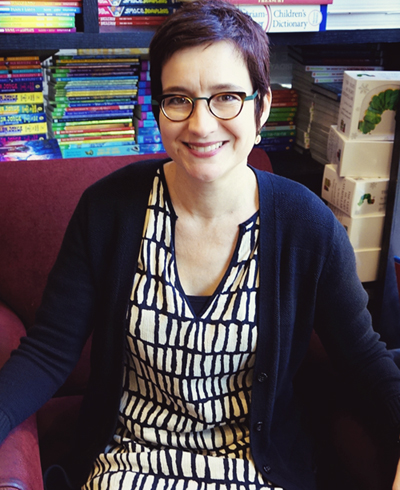
All Lit Up features Chicago's "literati" discussing their work, lives, and favorite Chicago books at their favorite Chicago bookstores. This is the second part in a two-part conversation with Mare Swallow, Andersonville-based writer, public speaking coach, and founder of the Chicago Writers Conference. Read the first part here.
Because of your work as founder and director of the Chicago Writers Conference, you're very involved in the Chicago writing world. What are your hopes for our literary community, and what do you hope the conference can do for the community?
Another Chicago author once asked me, "Why is it so important to you that Chicago gets attention?" The only answer I can come up with is love. I'm from here. It pisses me off that Tina Fey, who got her chops here, didn't stop here on her book tour for Bossypants. A lot of times people will tour in New York and Los Angeles, and then stop in Minneapolis instead of stopping here. Honestly, I don't think Minnesota has more of a robust community than we do. My hope for the community is that it will keep growing and becoming stronger. Chicago has this huge literary community. There are over 50 publishers here, but people don't know that. Some of them are very tiny, and some of them only put out chapbooks, but there are big ones too. I'm tired of Chicago being flyover country.
Continue reading this entry »
— Jami Nakamura Lin
Last week author Dave Reidy saw his first novel The Voiceover Artist released by Curbside Splendor. Gapers Block Book Club reviewed the book, but I wanted to follow up with him to discuss his writing and influences. Tonight, Monday, Nov. 16, Reidy hosts the Lit/Comedy Roundtable at Annoyance Theater, 851 W. Belmont Ave. at 7pm. This roundtable mixes Reidy's interests in entertainment and literature, which we touch upon in this interview.

What was the transition from writing your short story collection to your first novel? Did anything about your writing process change?
The first several drafts of the novel were written entirely from the perspective of its main character, Simon Davies. But Simon still wasn't coming alive on the page in the ways he was in my head, so I tried a different approach, writing chapters from the points of view of Simon's mother, father, brother, voiceover agent, ex-girlfriend, and others, interspersed among chapters told from Simon's perspective. I was determined that the book would remain a novel with narrative threads that moved forward through each of the book's chapters. But I did draw upon some of my short-story-writing technique in ensuring that each of these first-person chapters was complex and, as much as is possible for a piece that is a novel chapter and not necessarily a stand-alone story, complete.
Continue reading this entry »
— John Wawrzaszek
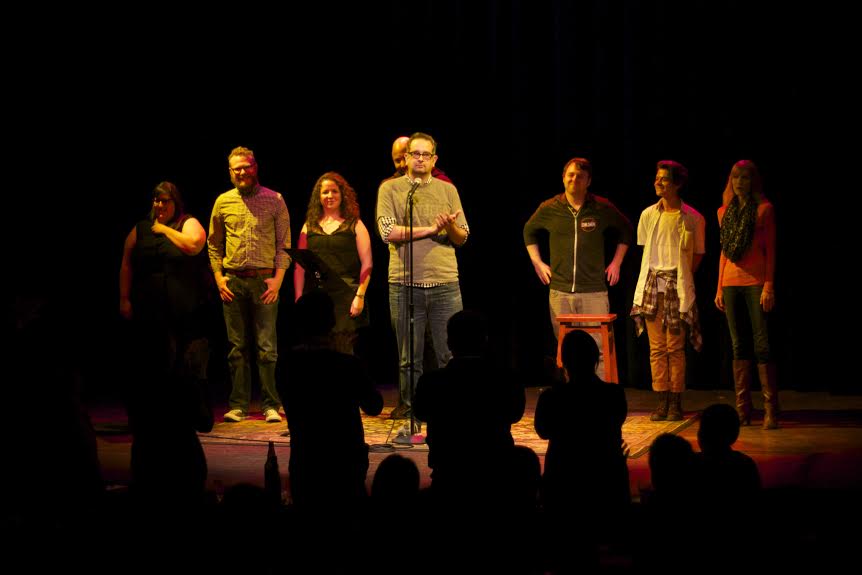 The live lit show You're Being Ridiculous will celebrate its fifth anniversary with three knockout shows on November 21, November 28, and December 5 at the Mayne Stage (1328 W. North Avenue). The shows will feature true stories performed by Megan Stielstra, Carly Oishi, Keith Ecker, and many others. Tickets are $15 and can be purchased here.
The live lit show You're Being Ridiculous will celebrate its fifth anniversary with three knockout shows on November 21, November 28, and December 5 at the Mayne Stage (1328 W. North Avenue). The shows will feature true stories performed by Megan Stielstra, Carly Oishi, Keith Ecker, and many others. Tickets are $15 and can be purchased here.
We talked to founder and performer Jeremy Owens via email to find out more about the past, present, and future of the show.
Continue reading this entry »
— Jami Nakamura Lin

All Lit Up features Chicago's "literati" discussing their work, lives, and favorite Chicago books at their favorite Chicago bookstores. This is the first part in a two-part conversation with Mare Swallow, Andersonville-based writer, public speaking coach, and founder of the Chicago Writers Conference. She brought Sin in the Second City by Karen Abbott and The Hundred Year House by Rebecca Makkai. We sat down for coffee at The Book Cellar in the heart of Lincoln Square.
I'm so glad you chose to meet here at The Book Cellar, my local bookstore. Why is this your favorite bookstore in Chicago?
I started coming here since they first opened in 2004. At the time, I lived in Ravenswood, and like you, it was nice to have something close to my house. When I suggest this to people, I always say "You know they have a wine bar there!" The owner, Suzy Takacz, has always been supportive of us. We're going to have two more events here in 2015. They host Essay Fiesta, they have local author nights, so that really speaks to me. I get a coffee and buy a book and close out the world.
And it has such a cozy atmosphere.
Yes, and it's smaller. It's like a curated bookstore. I tell my friends, "Imagine if there was a bookstore, and they got rid of all the crappy books. That's The Book Cellar." I like that their selection is great, and if they don't have a book they'll order it for you.
(As if on cue, Suzy appears to hand Mare an order of books.)
Continue reading this entry »
— Jami Nakamura Lin
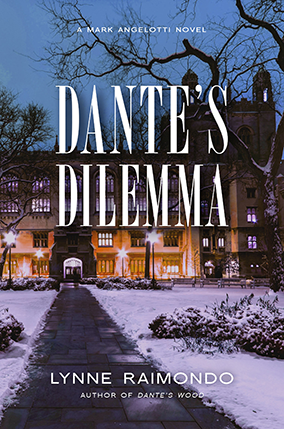 The most interesting investigator in Chicago's strong tradition of crime fiction isn't a detective, a lawyer, or even a journalist. Mark Angelotti, the wisecracking protagonist of Lynne Raimondo's Dante series, is a blind psychiatrist turned expert legal witness. Instead of Michael Harvey and Sara Paretsky's blue-collar gumshoes, Angelotti is an eloquent, overeducated mix between Matthew Murdock (Netflix's "Daredevil") and Will Graham (NBC's "Hannibal").
The most interesting investigator in Chicago's strong tradition of crime fiction isn't a detective, a lawyer, or even a journalist. Mark Angelotti, the wisecracking protagonist of Lynne Raimondo's Dante series, is a blind psychiatrist turned expert legal witness. Instead of Michael Harvey and Sara Paretsky's blue-collar gumshoes, Angelotti is an eloquent, overeducated mix between Matthew Murdock (Netflix's "Daredevil") and Will Graham (NBC's "Hannibal").
Angelotti's third mystery in Dante's Dilemma (after Dante's Wood and Dante's Poison) takes him to the South Side, where a professor infamous for pushing a misogynistic brand of sociology has been found murdered on the University of Chicago campus in Hyde Park during the annual scavenger hunt. The chief suspect: his estranged wife, Rachel Lazarus, who supposedly suffered a long history of domestic violence at the professor's hands.
Continue reading this entry »
— Adam Morgan
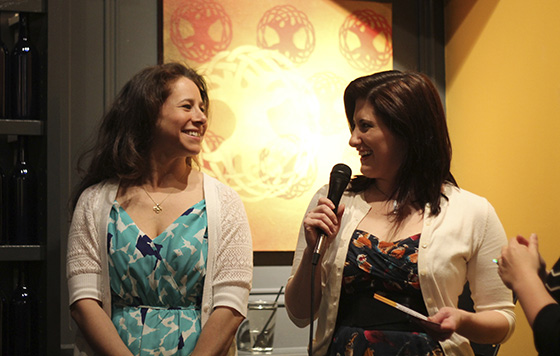
Like the Poetry Slam of the '90s and early aughts, storytelling is having its live lit moment in the sun in recent years. Popularized by shows such as The Moth in New York City, contemporary storytelling is the reading or performance of personal narratives in front of a live audience.
Chicago has no shortage of regular storytelling events, but each year an audience gathers around a cozy firepit on the North Shore for Story Sessions' Annual Campfire. This year's show featured stories by Doug Reed, Diane Kastiel, Dan Sheehan, Kristin Clifford, (Gaper's Block own) Andrew Huff and Jennifer Peepas. This year's Campfire Stories took place on Saturday, Sept. 19. This year's theme "Creep," did not disappoint.
Continue reading this entry »
— Jeanne Newman
Lori Rader-Day is one of Chicago's most exciting and talented writers, having won massive praise last year for her first novel, The Black Hour, a murder mystery set in Chicago. On July 7 her second novel, Little Pretty Things, will be published by Seventh Street Books, and it's one of the best books I've read in 2015.
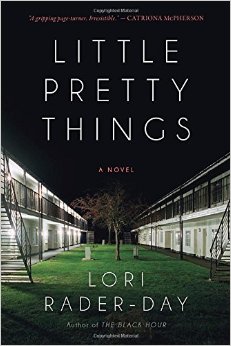 Set in the farthest reaches of Chicagoland -- a fictional small town called Midway in the cornfields of northwestern Indiana -- Little Pretty Things centers on a bizarre murder at a roadside motel, when a maid named Juliet Townsend discovers the body of her best friend from high school. It's creepy, clever, and full of surprises, the kind of book you stay up all night to read in one sitting.
Set in the farthest reaches of Chicagoland -- a fictional small town called Midway in the cornfields of northwestern Indiana -- Little Pretty Things centers on a bizarre murder at a roadside motel, when a maid named Juliet Townsend discovers the body of her best friend from high school. It's creepy, clever, and full of surprises, the kind of book you stay up all night to read in one sitting.
Rader-Day completed her MFA in Creative Writing here in Chicago at Roosevelt University, under the mentorship of another great Chicago writer, Scott Blackwood. She was kind enough to chat with me at length about her new book.
Continue reading this entry »
— Adam Morgan
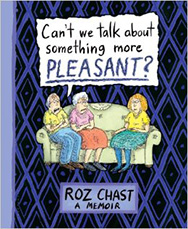 It takes great skill and dedication to be recognized as one of the top names in any field. For cartoonists, Roz Chast is one such person. Chast is an award winning cartoonist and author of her own books, as well a staff cartoonist for The New Yorker. Chast's most recent book is her memoir titled Can't We Talk About Something More Pleasant?
It takes great skill and dedication to be recognized as one of the top names in any field. For cartoonists, Roz Chast is one such person. Chast is an award winning cartoonist and author of her own books, as well a staff cartoonist for The New Yorker. Chast's most recent book is her memoir titled Can't We Talk About Something More Pleasant?
I got to talk with Chast via email about her memoir and her work as a cartoonist. Chast will be in Chicago on Wednesday, May 13 as keynote speaker of the Chicago Institute for Psychoanalysis Annual Benefit, at the Standard Club, 320 S. Plymouth Ct.
In your work Can't We Talk About Something More Pleasant? you deal with the subject of aging and loss. What made you choose this subject matter as the focus for your graphic memoir?
It seemed like a very rich and emotionally engaging subject, one that I hadn't known much about until I was more or less forced to deal with it. Also, my parents were unusual people. I felt it would be interesting to draw and write about our relationships with one another.
Continue reading this entry »
— John Wawrzaszek
Events Wed May 06 2015
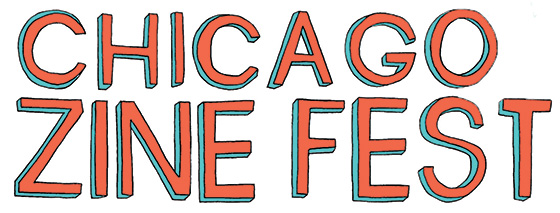
Chicago Zine Fest holds its sixth annual celebration of self-publishing this weekend, May 8 and 9. The weekend's programing is a mix of exhibition, live performances, workshops, and discussions all organized by a dedicated all-volunteer staff. Things kick off Friday at 5pm at Access Living, 115 W. Chicago Ave., with a night full of events.
A panel discussion, Zines: A Future Craft, will focus on the history and future of zine creation in our culture. Moderated by Barnard College Librarian Jenna Freedman and sponsored by The University of Chicago Library, the panel will include invited guests and zine creators Jonas, Julia Eff, and Ocean Capewell. Following the panel will be a reading Zines: The Next Generation featuring students from Chicago Public Schools, Convergence Academy, and 826CHI among others. Closing out the night will be readings and performances from festival exhibitors.
On Saturday, May 9 the festival proper starts at 11am at Plumbers' Union Hall, 1340 W. Washington Blvd. Tables set up exhibition style will be full of zines, comics, chapbooks, and magazines from over 250 self-publishers from Chicago and around the country. Workshops on radical poetry, resisting assimilation, youth performance, hands-on drawing, and more will be presented by the Busy Beaver Button Company, the International School of Comics, and representatives from the Poetry Center, and the Museum of Contemporary Art.
The festival has become an institution in Chicago's independent literary and art community. To keep things fresh, this year organizers shifted annual scheduling date from March to May and moved programming to new venues. I spoke with Julie Koslowsky, CZF coordinator of youth readings and day-of programming, to explore some of changes and how they were embraced by the community.
Continue reading this entry »
— John Wawrzaszek /
Author Fri Mar 06 2015

Image courtesy of Justin Castaneda
Get ready to fan the flames of your fandom this weekend at Wizard World Fan Fest Chicago 2015. It's the first fan convention of its kind in Chicago, and is a "Fang (or Thank) You" to devoted Wizard World fans and con attendees. It's loaded with enough celebs and artists to ensure that everyone will geek out on the convention floor. Fan Fest Chicago runs March 7-8 at Donald E. Stephens Convention Center, 5555 N. River Rd. in Rosemont. Here's the event and panel schedule for the weekend.
Aside from stars like "The Walking Dead's" Norman Reedus and "Orange Is The New Black's" Taryn Manning, Fan Fest Chicago will feature local artists like Justin Castaneda. Castaneda, who is a writer/illustrator from the south side of Chicago, is the creator of the When I Was Little picture book series and HEART. He is currently the illustrator for Wonder Care Presents: The Kinder Guardians with writer Victor Dandridge and Vantage InHouse Productions. He is also a featured artist in comic properties such as Aw Yeah Comics, Omega Comics Presents, and Scratch 9.
I asked Castaneda about his work and upcoming convention trips. Read on to learn more about this homegrown talent.
Continue reading this entry »
— Danette Chavez
Author Tue Nov 25 2014
Donna Seaman was happy to speak with me. It was a surprise; her reputation preceded her. I knew Seaman was the woman who'd interviewed Martin Amis at this year's Chicago Humanities Festival. She is also a senior editor of Booklist.
These facts alone I describe as a "reputation": leafing through its pages on the bus downtown, I recognized Booklist as the answer to my past weekend's wondering, of literature's fading importance; and Amis was the coy and mellifluous knight at the masthead of that importance. We had all cheered, in the audience, when he came on stage. Because in his dry wit and Swansean tone we all thought we were hearing something of the truth.
She had a hand in both worlds and that fact alone led me to anticipate she'd be a little bit scary. She wasn't.
Continue reading this entry »
— Alex Thompson
Events Wed Aug 27 2014
Stare was an independent publication released from 1976 to 1991 by artist, print maker, and teacher Kevin Riordan. The publication collected irreverent, arresting graphic art and writing with equal attention to how it was printed and bound. To celebrate Stare's legacy, Riordan approached Spudnik Press to host the exhibit Recombinant Stare. The show includes issues of the magazine as well as books, posters, press sheets, and photographs. It brings together recent and selected works by some of Stare's contributors, including Wayne Bertola, Mike Brehm, Elroy Christy, Peter Hannan, Jean Riordan and the late Fritz Wolfmeyer. The exhibit will also be the impetus for a new publication, the first in over two decades, curated by Riordan.
In order to fully understand the scope of Stare, I emailed its creator for an interview. Riordan discusses his printing process and the subsequent release parties thrown over the years. He talks of lofts spaces, early punk bands, and DIY printing. In doing so, he also provides a glimpse into the history of Chicago's independent print community. This is a tremendous story of a passionate artist and how he made his publication come to life.
Continue reading this entry »
— John Wawrzaszek
Books Fri Jul 04 2014
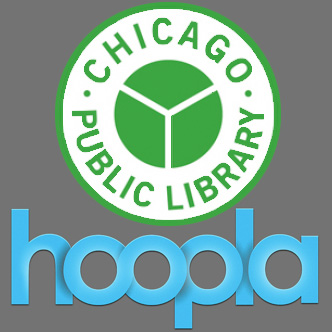 Before the industrial revolution, only an affluent elite could afford to have libraries in their homes. Today we enjoy public libraries precisely because technological advancements made the mass production of books feasible, affordable. Now, technology has once again fostered a possible next step in library advancement: Hoopla Digital.
Before the industrial revolution, only an affluent elite could afford to have libraries in their homes. Today we enjoy public libraries precisely because technological advancements made the mass production of books feasible, affordable. Now, technology has once again fostered a possible next step in library advancement: Hoopla Digital.
Recently adopted by Chicago Public Library, Hoopla Digital is a supplemental digital library brimming with audiobooks, videos, music and, later this year, e-books. Currently operating through 23 libraries in the greater Chicago area, and offering nearly 200,000 titles to download or stream 24 hours a day, seven days a week.
And, like the library, it's all free.
"I've been serving public libraries for 25 years, and so public libraries have really been near and dear to my heart," says Jeff Jankowski, the founder and president of Hoopla Digital. "I think they really empower people to discover and find their own voice, so I want to give -- and my company wants to give -- Hoopla as a tool, as a digital brand for public libraries throughout North America... to really allow them to stay relevant in the digital age."
A digital offshoot of Midwest Tape, a media distributor that has sold physical items to public libraries for over two decades, Hoopla operates much in the same way that physical distribution does. Libraries pay for titles, and make them available to users free of charge. The only difference here is that the library only pays for titles per use by library cardholders, and they pay less per rental than they do in physical book acquisition.
With Hoopla the cost to the library of purchasing a book decreases significantly -- from approximately five dollars per title to, on average, $1.95, Jankowski estimates. Thus the information bound up in books (as well as films and albums) becomes accessible to even larger audiences. "I think that digital books, digital media, has a really important place," says Jankowski, "because you don't have to be in a physical location. It allows greater access, accessibility to all people."
Continue reading this entry »
— Miden Wood
Author Thu Apr 24 2014
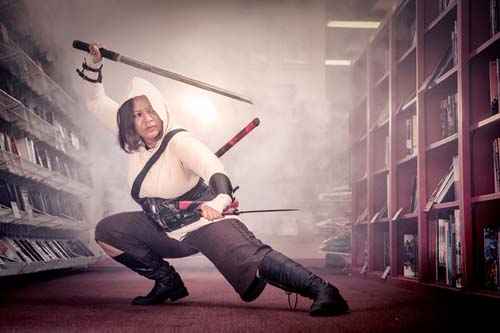
Michi Trota. Photo by Braden Nesin.
Invisible: Personal Essays on Representation in SF/F, an anthology about the importance of representation in science fiction and fantasy edited by Jim C. Hines, was released earlier this month (all e-book proceeds will go to Con or Bust). The collection is made up of heartwarming, and heartbreaking, posts on inclusion and exclusion, many of which originally appeared on Hines' blog. Michi Trota, a Chicago writer, speaker, community manager/organizer, geek, and -- what's the word? oh, yeah -- badass, contributed "I Don't See Color," an excellent essay about how her fandom(s) helped her to recognize how much she has struggled with her relationship with race. I recently asked Trota some questions (one for every panel she's appearing in at C2E2 this weekend -- well, almost) about her piece for Invisible, and her involvement in the geek community.
Continue reading this entry »
— Danette Chavez
Author Thu Apr 17 2014
-thumb-1212x808-14643.jpg)
Photo by Ryan Bourque
Sad Brad Smith: I'm going to get another coffee.
Gaper's Block: That's going to be in the interview.
What? "I'm going to get another coffee"?
There it is again. It'll be in there twice.
I'm going to get another coffee.
Nice.
(Brad gets coffee and comes back, reads an email, his brow furrows)
Oh.
What is it?
Are you recording?
Yeah. Is it big?
I'll tell you later.
Continue reading this entry »
— Alex Thompson /
Author Mon Mar 24 2014
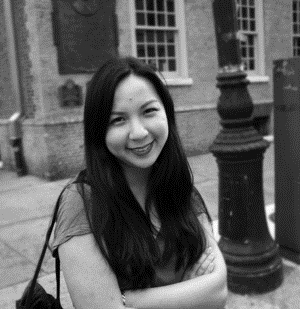 Poets & Writers recently helped organize the Barry Gifford reading for Story Week at Columbia College. After hearing Barry speak, I wanted to find out who it was on the East Coast who had made the event happen. Who was "Poets & Writers"?
Poets & Writers recently helped organize the Barry Gifford reading for Story Week at Columbia College. After hearing Barry speak, I wanted to find out who it was on the East Coast who had made the event happen. Who was "Poets & Writers"?
In my search, I found Program Associate Cathy Linh Che. I read some of her poetry online; "Doc, there was a hand" and "Split" I realized quickly I wasn't tracking down an administrator, but a poet.
She was in the lunch line when I called.
Continue reading this entry »
— Alex Thompson
Events Thu Mar 13 2014
Next week marks the return of one of Chicago's most beloved literary events, Columbia College Chicago's Story Week Festival of Writers. Beginning on March 16 through the 21, Story Week aims to build "a city of words" says Randy Albers, founding producer of the festival and writing faculty at Columbia College, in the Story Week welcome message. This year's theme is DiverCity, the connection between diversity and the urban landscape and how they come together to celebrate the power of urban stories.
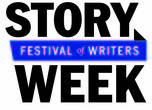
Chicago has a great many writers who exemplify this festival's theme. One of Chicago's notable writers Stuart Dybek, will be featured at the festival. He is author of the fiction Childhood and Other Neighborhoods, The Coast of Chicago, I Sailed with Magellan, and the poetry collections Brass Knuckles and Streets in their Own Ink. He has two upcoming story collections, Ecstatic Cahoots and Paper Lantern, which will be released in June. In his writing, the city acts as a back drop, a kinetic character. Dybek will help Albers vision this year in building a 'city of words'.
I got to ask Dybek a few questions about his new books, his events at Story Week and about the short story in general.
You will be on the Story Week panel, "Why the Short Story". You're definitely an authority on the subject with your previous fiction collections and your upcoming releases. What draws you to writing in that format?
Let me preface my answer by saying that some of the aspects that draw me to the short story are certainly not exclusive to the short story. There's a considerable overlap between literary genres and its far more accurate to see genres as arranged along a continuum rather than to treat them as if they inhabit separate gated communities. For me the short story is a good form in which to work with a kind of literary version of chamber music. Because of the scale of the story one can crank up and try to sustain intensity without fatiguing the reader. One might, of course, say the same about poetry, and an often heard observation about the short story form is that the compression it demands gives it a closer kinship to the poem than to the novel. I've long been fascinated by story collections that have some kind of unity--unity of place like Dubliners or Winesberg, Ohio , for instance, or unity of characters and action such as The Things They Carried. Sometimes such collections are given the paradoxical name, the novel in stories, which is misleading. The so called unity of such books actually emphasizes the fragmentary nature of personal life and of community. That sense of finding order, or at least patterns, within fragmentation is central to modernism.
Continue reading this entry »
— John Wawrzaszek
Author Mon Mar 10 2014
For the last five years March has brought the Chicago Zine Fest, a celebration of independent self-published work. Being the fest's fifth anniversary, the programming commemorates other zinesters who have been publishing zines for a even longer. The festival begins with a Friday afternoon panel entitled, In it for the Long Haul: A Discussion on Longevity in Zines. Among the panelists is Tomas Moniz, writing faculty at Berkeley City College and publisher of the zine Rad Dad. He has been putting out that title for 10 years. In it, he deals with the ideal of radical parenting from various perspectives outside of the societal norms of parenting. And he should know what he's talking about, Moniz is a father of three. He has a new novella Bellies and Buffalos, a tender though chaotic story about friendship, family and Flammin Hot Cheetos.
I got to talk with Moniz and ask him a few questions about his writing and his upcoming visit to Chicago.
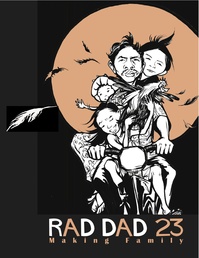
What was the initial motivation that prompted you to write Rad Dad?
I was going through a difficult time with my then teenage son, and reaching out for information that didn't repeat the same conversation around punishment and discipline all the books were talking about. Then I discovered The Future Generation by China Martens, a zine about parenting and anarchism. It changed everything. I wrote a letter, she answered, and then I just started a zine for fathers to talk about fathering in meaningful, feminist, anarchist ways. I started the zine I longed to read.
Recently you've decided to re-launched Rad Dad. What did was that process?
Rad Dad is relaunching as a full-color, large-format magazine to push past the patriarchy with even more stories from the frontier of radical parenting. There is so much more than the mainstream representations of fathering, which are mostly white and middle class. I've learned so much from queer fathers, from trans fathers, fathers of color. Through Rad Dad, I am trying to represent fathering as a holistic, vulnerable thing. Fathers need to change--not just diapers.
Continue reading this entry »
— John Wawrzaszek
Books Mon Feb 10 2014
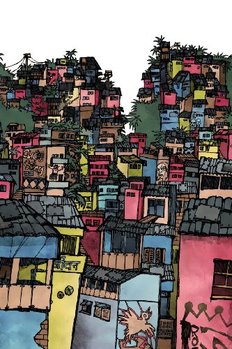 While on a class trip in Cuba, college junior Asha Veal Brisebois' camera died. The year was 2003, so phones were not yet the Swiss army knives of capture they are today, and finding a replacement battery proved impossible. Without an instrument to record her experiences visually, Veal Brisebois picked up a pen.
While on a class trip in Cuba, college junior Asha Veal Brisebois' camera died. The year was 2003, so phones were not yet the Swiss army knives of capture they are today, and finding a replacement battery proved impossible. Without an instrument to record her experiences visually, Veal Brisebois picked up a pen.
"I started writing travel stories--nonfiction--about our group's time there," she said. "At the time I was really into literary journalism, on-the-road pieces, and nonfiction work about place. I was a total devotee of Joan Didion's Slouching Toward Bethlehem."
Veal Brisebois' experience certainly wasn't the first time necessity became the mother of invention, but it may have been the first time a dead battery led to a publishing company.
Continue reading this entry »
— Lara Levitan
By Stuart Ross
Operated by Ukrainian Village resident Julia Klein, and with strong ties to Chicago artists and educators, Soberscove Press has been bringing new and overlooked documents to the general public and academic audiences since 2009. From transcripts that elucidate the beginnings of Abstract Expressionism, to the performative happenings of the Soviet-era avant-garde group Collective Actions, Soberscove fills a much needed gap in art publishing, shaping how we think about recent art history.
In addition to being responsible for every aspect of the press, Klein is an artist in her own right, whose work investigates how objects and materials persist over time. In 2013, she was an artist-in-residence at the Museum of Contemporary Art Detroit; a researcher in the Art Library at Sitterwerk in St. Gallen, Switzerland; and a fellow in the Terra Foundation Summer Residency in Giverny. She also teaches under-served Chicago youth at the Marwen Foundation.
I caught up with Klein to discuss the origins of the press, the role of publishing in constructing history, and what's in store next year.
Continue reading this entry »
— Book Club
Author Tue Nov 26 2013
Just in time for Thanksgiving, I'd like to point out my new favorite true crime book: Survived By One: The Life and Mind of a Family Mass Murderer by Robert E. Hanlon with Thomas V. Odle. It's much more than a true crime book. After my thoughts, please read on for an interview with Dr. Hanlon.
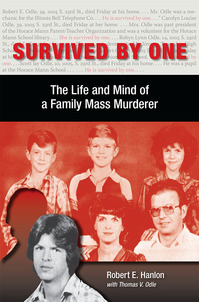 In 1985, Thomas Odle killed his parents and three siblings at the age of 18 in southern Illinois and is now serving life in prison. This book is from the perspective of both Dr. Hanlon, a neurologist, and Tom Odle, the murderer himself. Tom reflects on his childhood in a first person point-of-view, while Dr. Hanlon assesses Tom's life experiences and how they led him to murder.
In 1985, Thomas Odle killed his parents and three siblings at the age of 18 in southern Illinois and is now serving life in prison. This book is from the perspective of both Dr. Hanlon, a neurologist, and Tom Odle, the murderer himself. Tom reflects on his childhood in a first person point-of-view, while Dr. Hanlon assesses Tom's life experiences and how they led him to murder.
This book is haunting. Tom Odle's childhood was hell. His mother abused him, chained him to his bed, made him raise his three younger siblings, and constantly told him how much she hated him and how she wished he'd never been born. He wasn't allowed to go anywhere other than school and wasn't allowed to have anybody over, so his social skills lacked heavily. In kindergarten, Odle went to school with a shirt soaked in blood from the whip marks on his back. It wasn't until he was strong enough to fight back that she stopped the physical abuse, but the emotional and verbal abuse never ceased. Tom never had confidence or self-worth. His dad stood by and did nothing, as if he too feared Tom's mother.
Continue reading this entry »
— Mikaela Jorgensen
Events Wed Nov 13 2013
For a unique experience that joins graphic art and live music, look no further then Black Violet, a performance by Fifth House Ensemble this Sunday, November 17 at
Constellation, 3111 N. Western Ave., 8:30pm.
Black Violet Act I: Leagues of Despair, follows the life of a black cat named Violet in 17th century London during the outbreak of the bubonic plague. The story is written, illustrated and animated by Ezra Claytan Daniels, known for his critically acclaimed graphic novel series The Changers, and a digital animated graphic novel Upgrade Soul, which was released on Opertoon. Daniels is also the creator of the Comic Art Battle, a live art event that pits artists against one another before a crowd.
Black Violet follows the protagonist through the streets of London as she looks for her owner while staving off capture; black cats were suspected plague carriers. The beautifully drawn artwork is complemented with musical accompaniment by Chicago's Fifth House Ensemble, a versatile and dynamic chamber music group. The score celebrates the works of Brahms, Walter Piston, and Jonathon Keren, among others.
I spoke with Daniels to learn more about Black Violet's partnership of music and art. He discussed collaborating with Fifth House and preparing his graphic art and text for the show.
Continue reading this entry »
— John Wawrzaszek
Author Wed Oct 30 2013
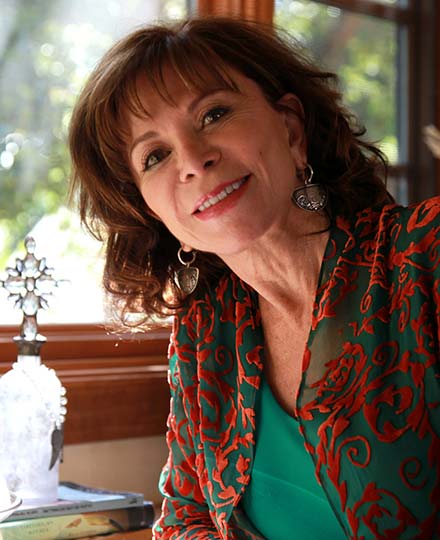 "You should always have a phallic microphone," joked Isabel Allende as she switched out a dead lavalier microphone for a handheld one. So began Allende's half-hour talk at the Harold Washington Library on Tuesday, Oct 22. Allende was in town to accept the Chicago Public Library Foundation's Carl Sandburg Literary Award. Allende, whose 19 books have been translated into 35 languages and have sold 57 million copies around the world, was interviewed by Univision's Angelica Atondo.
"You should always have a phallic microphone," joked Isabel Allende as she switched out a dead lavalier microphone for a handheld one. So began Allende's half-hour talk at the Harold Washington Library on Tuesday, Oct 22. Allende was in town to accept the Chicago Public Library Foundation's Carl Sandburg Literary Award. Allende, whose 19 books have been translated into 35 languages and have sold 57 million copies around the world, was interviewed by Univision's Angelica Atondo.
Perhaps the most personally influential book for Allende is Paula, which Allende described as the most memorable book she has produced, "written with tears and blood." It was written as her daughter Paula was in a coma, never to wake up, due to complications from the disease porphyria. Coincidentally, Allende's talk took place on Paula's birthday. While Allende generally considers herself a happy person, she maintained that her kind of sadness at losses such as Paula's death is "a softness of the heart that is always under the surface." Allende has received thousands of letters in response to Paula, and has started a foundation in Paula's honor that focuses on reproductive rights, healthcare, and "the poorest of the poor, illegal immigrants."
Allende acknowledged that while the world is a sometimes a sad place, a sense of humor is one way to make it a brighter. However, she worries that the humor from her native Chile doesn't translate well into English. It's too dark and not politically correct, especially in California, where she has resided since 1989. Allende relayed the story of how when dogs training as service animals for the blind do not pass the final test, they are put up for adoption. Allende requested one of the rejected dogs, and received a letter from a sensitive writer reminding her that the dogs are not rejected; they have simply made a career change.
Allende ended her talk by reading from her latest work, Ripper, her first foray into mystery writing. Attending a mystery writers' conference with "the loveliest people, usually these middle aged ladies in Birkenstocks...who only talk about autopsies and murders and how to dispose of cadavers" not only proved a quick education for Allende, but gave her the skills "so I could kill anybody and never get caught."
The interview is available in its entirety on Univision's website. (Though the website is in Spanish, the interview is in English.)
Image courtesy of Isabel Allende's website
— Kathryn Pulkrabek
Author Wed Oct 30 2013
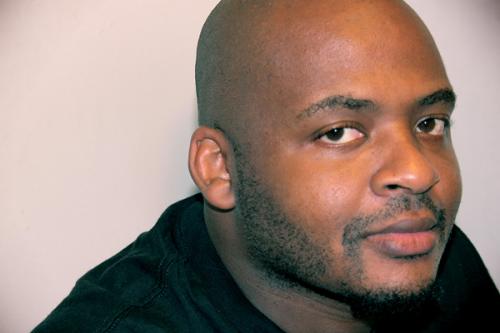
Mississippi author Kiese Laymon walked away from the would-be publisher of his audacious debut novel, Long Division, because, according to his editor, its racial politics were too explicit.
"I felt like a failure," Laymon says of hearing her reaction. "And then I felt angry. And then I felt compelled to prove her wrong."
And prove her wrong he did. Evanston-based publisher Agate had published work by National Book Award-winning author Jesmyn Ward, a fellow Mississippi writer and inspiration to Laymon. "[Knowing that], I knew they'd at least partially get what I was trying to do," he said. This year Agate released not only Long Division, but also Laymon's essay collection, How to Slowly Kill Yourself and Others in America, the title essay of which went viral after it was posted on Gawker last year.
"I think [Agate's] surprised the books are doing so well," Laymon said. "They believed, but I know they're shocked at some of what we've done. That's a good thing. I like shocking people who care for me."
Continue reading this entry »
— Lara Levitan /
Rebecca Skloot is best known for her #1 New York Times bestseller, The Immortal Life of Henrietta Lacks. But before becoming a writer, Skloot earned a degree in biomedical sciences and worked as a veterinary technician. For more than a decade, she worked in private practices, research labs, veterinary schools, animal morgues, and emergency rooms, among other places. 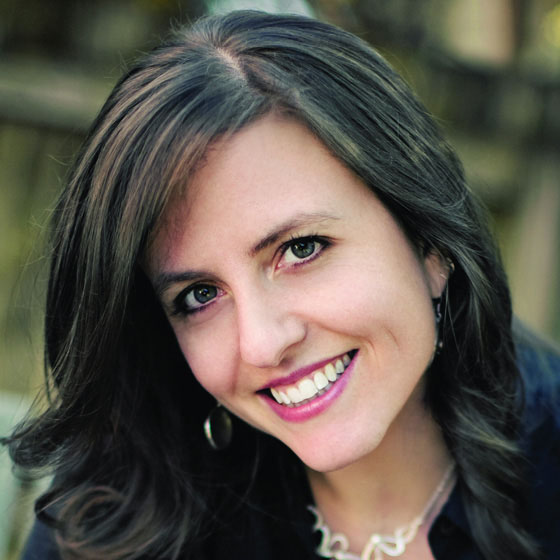
Inspired by these experiences and the ethical questions they raised, Skloot is currently working on an as-yet-untitled second book that will explore the science and ethics of the roles animals play in our lives and we in theirs. Skilled at combining science with a compelling narrative, Skloot intends to show how our relationship with animals is both beneficial and complicated - and not nearly as clear-cut as it first appears. Would someone who refuses to wear leather decline a cancer treatment based on animal research? What makes one animal a suitable service animal while another is deemed inappropriate? Why do we rescue some animals and kill others?
Rebecca Skloot will be sharing more about her new project in the program "Rebecca Skloot: Creatures Great and Small" as part of the Chicago Humanities Festival on Sunday, October 20 at 1pm at the University of Chicago. For tickets and more information, visit the Chicago Humanities Festival website.
I recently had the opportunity to chat with Rebecca about her upcoming book, tricking people into learning science, wild dogs, and frontal lobes.
Continue reading this entry »
— Kathryn Pulkrabek /
Events Mon Oct 14 2013
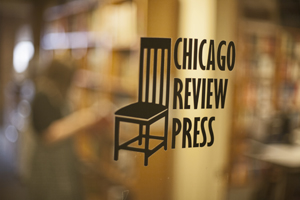 Like a rock n' roll band, Chicago Review Press started in a garage. And with a rock n' roll attitude, the independent press has published quirky and controversial books since 1973. (Sample titles: Working While Black: The Black Person's Guide to Success in the White Workplace by Michelle T. Johnson, Mini Weapons of Mass Destruction: Build Implements of Spitball Warfare by John Austin.)
Like a rock n' roll band, Chicago Review Press started in a garage. And with a rock n' roll attitude, the independent press has published quirky and controversial books since 1973. (Sample titles: Working While Black: The Black Person's Guide to Success in the White Workplace by Michelle T. Johnson, Mini Weapons of Mass Destruction: Build Implements of Spitball Warfare by John Austin.)
Currently publishing 65 new titles a year under four imprints, CRP has not only survived but thrived in a tumultuous era for the industry. This year, the River North press celebrates its 40th anniversary. Book Club caught up with Publisher Cynthia Sherry, who started her career at CRP as an accountant, moved on to editorial director in 1995, and publisher in 2004. Sherry shared insights on CRP's success, what hopeful authors need to know about submitting, and plans for the future (hint: more intriguing books!).
Continue reading this entry »
— Lara Levitan
Author Tue Sep 24 2013
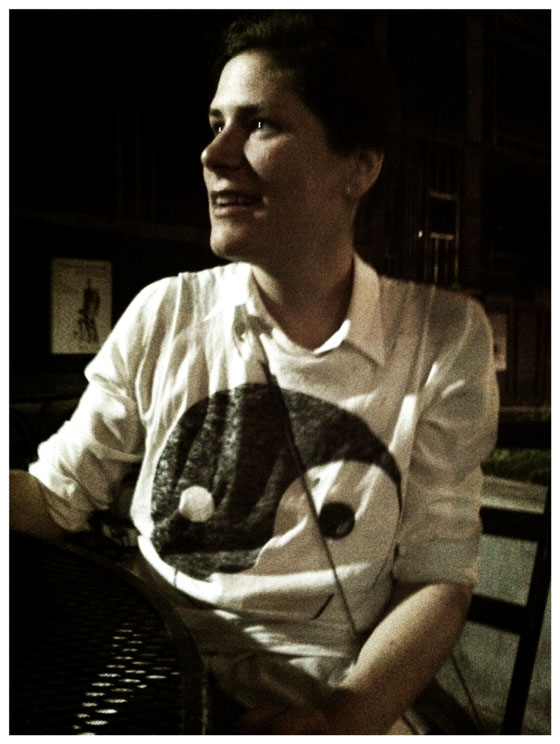 "It was like swimming with a whale shark."
"It was like swimming with a whale shark."
This is how Hannah Pittard describes learning that her first novel, The Fates Will Find Their Way, (Ecco, 2011) was being published. Sounds dangerous, but Pittard is a dangerously talented writer.
Fates tells the story of a missing teenage suburban girl and the group of neighborhood boys who becomes enraptured by her disappearance. It's been compared to The Lovely Bones and The Virgin Suicides (not bad, especially for a first novel).
Pittard's fiction has won several awards. She is a graduate of the University of Chicago, got her MFA at the University of Virginia, teaches at DePaul, and is currently at work on her second novel, Reunion, (Grand Central) out in 2014. Read on, and get to know Hannah Pittard.
Birthplace: Atlanta, Georgia
Star sign: Sagittarius
What drives you to write?
A feeling in the pit of my stomach. A feeling in my chest. You know that time of night when it's pink? It's not every night, but some nights there's this pinkness in the air and I can feel it my chest -- this bigness, this need to capture it. Which isn't to say I'm trying to capture the night or its beauty. There's just a similarity between that feeling of pinkness and the need to write.
Continue reading this entry »
— Lara Levitan
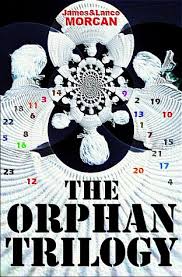 Good spies aren't born; they're made. Such is the case for the genetically altered spies in The Orphan Trilogy, a series of international conspiracy thrillers by New Zealand authors James Morcan and Lance Morcan.
Good spies aren't born; they're made. Such is the case for the genetically altered spies in The Orphan Trilogy, a series of international conspiracy thrillers by New Zealand authors James Morcan and Lance Morcan.
Chicago is featured prominently as the site of the Pedemont Orphanage, where 23 orphans acquire the skills to become stealthy, cold-blooded killers. James Morcan was happy to shed some light on how the city's famed work ethic influenced the decision to begin the story here, and to discuss whether we'll see any Pedemont Orphanage alums skulking around Chicago corners in the near future.
Continue reading this entry »
— Kathryn Pulkrabek
Author Wed Sep 11 2013
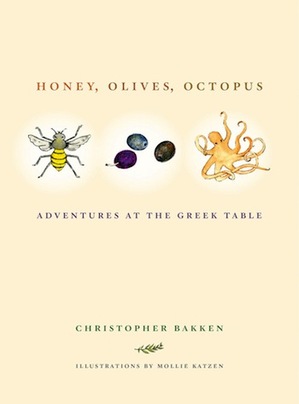 If you're like me, anything you know about Greek cuisine comes from My Big Fat Greek Wedding. Do yourself a favor, put down the remote and crack open Christopher Bakken's new book Honey, Olives, Octopus: Adventures at the Greek Table. You won't find ruminations on pedestrian hummus or cheesy saganaki in these pages. Instead, Bakken takes readers on a journey around the archipelago that gets into the nitty-gritty of Greek staples: olives, bread, fish, cheese, meat, beans, wine, and honey. The result is a mouthwatering romp around the country, which never fails to celebrate the simplicity of ingredients nor the painstaking labor that makes that simplicity possible.
If you're like me, anything you know about Greek cuisine comes from My Big Fat Greek Wedding. Do yourself a favor, put down the remote and crack open Christopher Bakken's new book Honey, Olives, Octopus: Adventures at the Greek Table. You won't find ruminations on pedestrian hummus or cheesy saganaki in these pages. Instead, Bakken takes readers on a journey around the archipelago that gets into the nitty-gritty of Greek staples: olives, bread, fish, cheese, meat, beans, wine, and honey. The result is a mouthwatering romp around the country, which never fails to celebrate the simplicity of ingredients nor the painstaking labor that makes that simplicity possible.
Bakken will present his book at the National Hellenic Museum on Thursday, September 12 at 6pm. The event is free with museum admission ($10 for adults, $8 for seniors/students, $7 for children over 3). Light refreshments will be served, and one can only hope that they're even half as good as the dishes he describes. Before his visit to Chicago, Book Club caught up with Bakken. We discussed impractical recipes, the Midwestern and Greek value system, the importance of grandmothers and, of course, his book.
Continue reading this entry »
— Ines Bellina
Author Sat Sep 07 2013
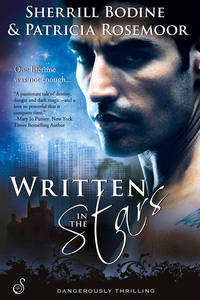 As veteran authors of the romance genre, Chicago-based Sherrill Bodine and Patricia Rosemoor have been crafting entangled love affairs for over two decades. Rosemoor has written 90 (that's right, 90) novels, many for the Harlequin Intrigue imprint (among others); and Bodine has written 19 novels, as well as a co-written comic book called Whispers From the Void.
As veteran authors of the romance genre, Chicago-based Sherrill Bodine and Patricia Rosemoor have been crafting entangled love affairs for over two decades. Rosemoor has written 90 (that's right, 90) novels, many for the Harlequin Intrigue imprint (among others); and Bodine has written 19 novels, as well as a co-written comic book called Whispers From the Void.
In celebration of the release of the authors' first co-written novel, Written in the Stars (available in ebook format only), the duo will host a digital launch party at McNamara's restaurant (4328 West Irving Park Rd.) on Tuesday, September 10 at 6pm. The free event will also be streamed online, and viewers may download their copy at the same time (the goal is to reach 5,000 downloads in one hour.) To watch online, tune in here at 6pm on September 10.
Book Club caught up with Bodine and Rosemoor before the big event.
Continue reading this entry »
— Lara Levitan /
Events Tue Sep 03 2013
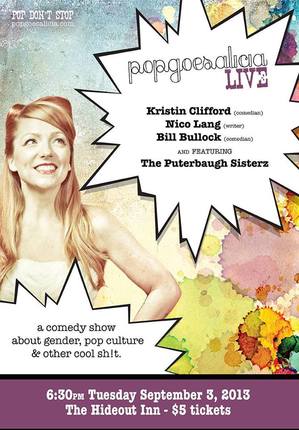 Let's face it, in a summer chock full of news, you've probably spent more time debating Skyler White's virtues than, say, discussing Syria. This might seem like another sign of humanity's imminent demise, but the truth is pop culture influences our society beyond meme creations. When you consider that Americans consume 1.27 TRILLION hours of media, you can't help but wonder the effect these messages have upon our psyche, especially when it comes to issues of gender and sexuality.
Let's face it, in a summer chock full of news, you've probably spent more time debating Skyler White's virtues than, say, discussing Syria. This might seem like another sign of humanity's imminent demise, but the truth is pop culture influences our society beyond meme creations. When you consider that Americans consume 1.27 TRILLION hours of media, you can't help but wonder the effect these messages have upon our psyche, especially when it comes to issues of gender and sexuality.
Continue reading this entry »
— Ines Bellina
Author Mon Aug 12 2013
Mirrors for Princes is the latest release from Chicago's very small Meekling Press, and it looks great:
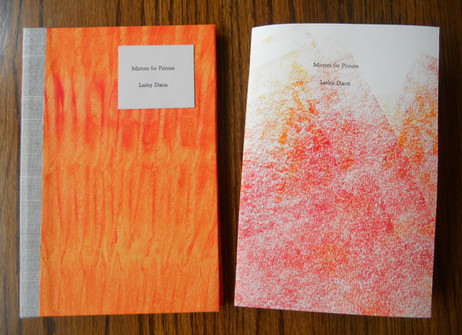
I got a chance to catch up through emails with Lesley Dixon, the author of this collection of bizarro micro-fictions on sale here. Dixon has recently relocated from Chicago to Austin, Texas.
You put this book out with Meekling Press. Can you explain what it's like to work with them?
It's a small operation of really talented people who are also tolerable, even charming. This is a rare thing, as talented people are usually the worst. Meekling books (and book-objects) are made entirely by hand, often with a letterpress; Rebecca does the design work and a lot of the heavy lifting, then everybody pitches in to assemble the parts. She's got a really amazing aesthetic, and everything Meekling publishes is completely unique in a way that both enriches the text and reflects the author. They're very cleverly constructed. So it was great to work with Meekling. They proposed a couple of designs, I loved it, we got some people together, we bought beer and pizza, and after a lot of diligent and tedious work with thread and glue and bone-folders, there was this awesome book with my name on it. The process was very straightforward, we didn't even have to bring lawyers into it.
Pizza and books? No lawyers? Sounds illegal to me.
It's a little known fact, but anything done without a lawyer present is actually illegal. Pizza, bookmaking, sex, everything.
I think I understand the economy much better, now, having learned this. What other projects are you involved in that we should know about?
Not much at the moment. I just moved across the country, and haven't really had time to glom onto any movements or projects yet. But my eyes are peeled for coattails to Marty McFly on. I know some talented people here and I'm excited about doing creative stuff with them. I'm also still in touch with Meekling, and I think someday it'll be a trans-national venture. I started working on a novel about a year ago because there wasn't enough futility in my life, and I'm just focused on finishing up the first draft right now. In other news, at the age of 27 with two degrees under my belt, I finally qualify for temp agencies, which I think is an important step in any writer's career.
I look forward to seeing how the spoils of bureaucracy influence your
work. Thanks, Lesley!
— John Wilmes
Author Wed Jun 26 2013
 I had never read any of Chicago native Allison Amend's work when she took over teaching my creative writing class for a legendary teacher on sick leave. Though she had rather large shoes to fill, she was unflappable, amazingly generous and available for her students. It wasn't until later that I found that that she's just as talented a writer as she is a devoted teacher. Her debut short story collection, Things That Pass for Love, won an Independent Publisher Book Award. Her first novel, Stations West, was a finalist for the Sami Rohr Prize for Jewish Literature. Her latest book, A Nearly Perfect Copy, is a brilliantly plotted character-driven novel involving con men, art forgery, DNA cloning, grief and loss.
I had never read any of Chicago native Allison Amend's work when she took over teaching my creative writing class for a legendary teacher on sick leave. Though she had rather large shoes to fill, she was unflappable, amazingly generous and available for her students. It wasn't until later that I found that that she's just as talented a writer as she is a devoted teacher. Her debut short story collection, Things That Pass for Love, won an Independent Publisher Book Award. Her first novel, Stations West, was a finalist for the Sami Rohr Prize for Jewish Literature. Her latest book, A Nearly Perfect Copy, is a brilliantly plotted character-driven novel involving con men, art forgery, DNA cloning, grief and loss.
Now an inhabitant of New York, Amend claims that Chicago will always be home. She answered a few questions about Chicago, research, and forgery.
You mention the Cubs in the first line of your official bio. Are you still a Cubs fan, and did that adequately prepare you for the pain and heartbreak that come with being a writer?
Once you are a Cubs fan, you are always a Cubs fan. It's in your blood, like that disease you caught in... like a regional accent. My grandmother was a Cubs fan until the day she died -- she did not live long enough to see the Cubs reach the World Series. I hope to live that long. And yes, the suffering of the Cubs fan, though, a unique and acute pain, does prepare you for the daily agony that is writing.
Continue reading this entry »
— Steve Gillies
Author Mon Jun 17 2013
Last weekend, Alan Sepinwall made an appearance at Printer’s Row LitFest to discuss his recent self-published book, The Revolution Was Televised. The book, an in-depth analysis of the recent evolution of small-screen entertainment, analyzes the factors that culminated to produce a higher standard of television entertainment. Such shows include “Oz,” “Friday Night Lights,” “Buffy the Vampire Slayer,” “The Sopranos” and “Mad Men,” to name a few.
When it comes to television analysis, Sepinwall is certainly a reliable source. Stemming from his days writing “NYPD Blue” reviews out of a dorm room, he is credited with having created something of a revolution himself, having pioneered a paradigm shift towards more informed viewership. Where before TV critics were primarily expected to review pilots and finales, now, following Sepinwall’s style, reviewers pick apart episodes for trends, symbolism, references, and make predictions regarding the weeks to follow. This more in-depth analysis owes a great deal of its influence to the groundswell of fan communities fostered by the rise of the internet.
Though one can certainly argue that the internet played a major role in this revolution, Sepinwall argues that the golden age of television began even before the onset of internet fandom, beginning in the late 1990s.
“Everyone had cable in their homes, and everyone had more and more channels, and that was A) splintering the audience, and B) these channels needed original programming and started doing it, HBO first and foremost among them. And so HBO started doing things like ‘Oz’ and ‘Sex and the City’ and most importantly ‘The Sopranos’ and they showed that A) you can get a pretty big audience doing this, and B) you can break all sorts of traditional storytelling rules that we had to this point held sacrosanct. And people will watch this.”
Continue reading this entry »
— Miden Wood
Books Mon Jun 10 2013
Anobium, an alternative Chicago-based press, is seeking writers to participate in two upcoming projects that explore the potential of creative collaboration. The first of these projects, based in Chicago though open to writers worldwide, is Middle Ground. The collaborative project is dedicated to the exploration of space, our experience of environments both virtual and actual, and the way in which such spaces inform the written word.
Anobium Editor Benjamin van Loon describes the process in his own words: “So you have a location: Middle Inlet, Wisconsin. Writer 1 will write up to 500 words about Middle Inlet, and then he/she will move onto a different ‘location,’ where 500-some words have already been written by a different writer. At the same time, a different writer will be visiting Middle Inlet, Wisconsin, adding up to 500 more words to Writer 1’s original text. Make sense? So for Middle Ground, we have a target of 15 participants, which means 15 locations. It would be impossible for all writers to visit all places, so each writer will be visiting five places, such that at the end of the project, each text written about each place will be around 2,500 words, compiled by five people. It’s like we’re all taking turns.
“The best analogy I have is this. Let’s say we’re on a tour bus. We stop at a roadside bathroom somewhere, and each of us has a big, fat permanent marker. Bathroom User 1 uses the stall, and in his/her boredom, writes ‘SLAYER RULES’ on the bathroom wall. Bathroom User 2 uses the stall next, and in his/her boredom, adds ‘THE UNDERWORLD’ to BU1’s graffiti. Bathroom User 3 uses the stall next, and he/she is kind of a prude, so he/she strikes through ‘S̶L̶A̶Y̶E̶R̶ ̶R̶U̶L̶E̶S̶ ̶T̶H̶E̶ ̶U̶N̶D̶E̶R̶W̶O̶R̶L̶D̶’ and writes ‘Stop drawing on bathroom walls.’ And so on and so forth.”
The second project, which will be based in New York, is Rescriptions II. A reincarnation of a previous project, Rescriptions is dedicated to the revival of lost stories through the injection of fresh perspectives. The process is simple: each writer brings to the group an old, tired story; one that doesn’t seem to be working. That story is handed to a second writer, whose task is to enhance and embellish the story’s strengths. After Writer 2 has tweaked the piece, it is passed along to Writer 3, Writer 4, Writer 5 and so on. By project’s end, the once-washed-up story is alive with the varied styles of a multi-minded author.
I had the opportunity to ask Mr. van Loon a few questions about both projects, and gain insight on the value of collaboration, the importance of place, and why you should get involved.
Continue reading this entry »
— Miden Wood
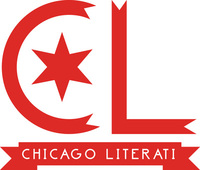 The city's literary community welcomes a new addition with Chicago Literati, part of Tribune Media's ChicagoNow blogger union. Chicago Literati captures the essence of the lit scene with book reviews, live reading reviews, event postings, reading lists, creative nonfiction essays, and even a bit of fiction and poetry every now and again. The site began last November as an independent project of recent Columbia College Chicago fiction writing graduate Abby Sheaffer. As acting editor-in-chief, Sheaffer wears many hats to maintain the site. She writes articles, reviews content, edits submissions, and solicits new contributors.
The city's literary community welcomes a new addition with Chicago Literati, part of Tribune Media's ChicagoNow blogger union. Chicago Literati captures the essence of the lit scene with book reviews, live reading reviews, event postings, reading lists, creative nonfiction essays, and even a bit of fiction and poetry every now and again. The site began last November as an independent project of recent Columbia College Chicago fiction writing graduate Abby Sheaffer. As acting editor-in-chief, Sheaffer wears many hats to maintain the site. She writes articles, reviews content, edits submissions, and solicits new contributors.
"I really work hard to make Chicago Literati feel like a community," says Sheaffer. "I think the greatest part of the Chicago literary community is the sense of family and how open everyone is to expression."
A community is building around the site's growing content. This includes the dedicated staff Sheaffer has amassed. "They're all so unique and talented," she says.
Many are students or recent graduates who are looking for a place to share their work. Even as young writers they are tackling subjects that apply to writers at most any level of experience. A recent post discussed how writers combat writers block.
Continue reading this entry »
— John Wawrzaszek
Events Tue May 14 2013
The success of last month's Salon Splendor has prompted Chicago's Curbside Splendor Publishing to reprise the event with another night of readings, music, and world-class tea, on Thursday, May 16, at 7:30pm. The show will take place at Madame Zuzu's 582 Roger Williams Ave. in Highland Park.
Curbside Splendor has been a partner in many reoccurring literary events such as the monthly Karaoke Idol at Beauty Bar and the seasonal Pop-up Book Fair held at the Empty Bottle.
According to Jacob Knabb, senior editor at Curbside Splendor and host of Salon Splendor, "a focused, monthly reading series has been lacking from our lives."
Continue reading this entry »
— John Wawrzaszek
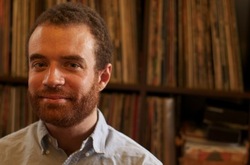 In the opening scene of local author Chris L. Terry's debut young adult novel, Zero Fade, 13-year-old Kevin Phifer gets a haircut from his mom. What he really wants is a stylish fade, but what he gets is more accurately described as "jacked up." Later in the book Kevin's role model uncle--who eventually comes out as gay--rescues Kevin from hair hell by taking him to the barber, where "grown men who are still cool" go.
In the opening scene of local author Chris L. Terry's debut young adult novel, Zero Fade, 13-year-old Kevin Phifer gets a haircut from his mom. What he really wants is a stylish fade, but what he gets is more accurately described as "jacked up." Later in the book Kevin's role model uncle--who eventually comes out as gay--rescues Kevin from hair hell by taking him to the barber, where "grown men who are still cool" go.
It's a vital scene, Terry explains, because it captures Kevin's struggle to confront his limiting ideas about homosexuality, coolness and manliness, themes that attract Terry to writers in what he calls the "urban nerd" genre, like Junot Diaz.
"You think of this stereotypical urban man as being black or latino, this kind of hyper-masculine, over-sexualized person," Terry said. "And I feel like a lot of the best stuff in that style of writing subverts that. Or the character is struggling with these really rigid and restrictive ideas about masculinity."
Born to a black father and an Irish-American mother, Terry is no stranger to struggles around identity and society's preconceived notions. Much of his writing, including short stories and essays, surrounds growing up in a biracial household. But in Zero Fade, which Curbside Splendor will publish this September (though you can preorder through Amazon), Terry drops his own concerns for those of his adolescent narrator, a kid who "always wants to get things right."
Terry, a graduate of the MFA in creative writing program at Columbia College, was born in Newton, Mass. (home of the famous fig cookie), and teaches creative writing and playwriting to juvenile inmates with Storycatchers Theatre. He sat down with Gapers Block Book Club to discuss writing, wiggers, and his adventures in punk rock.
Continue reading this entry »
— Lara Levitan
Author Mon Apr 15 2013
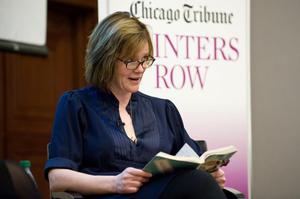 “Paul,
“Paul,
Greetings from sunny Seattle, where women are “gals,” people are “folks,” a little bit is a “skosh,” if you’re tired you’re “logy,” if something is slightly off it’s “hinky,” you can’t sit Indian-style but you can sit “crisscross applesauce,” when the sun comes out it’s never called “sun,” but always “sunshine,” boyfriends and girlfriends are “partners,” nobody swears but someone might occasionally “drop the f-bomb,” you’re allowed to cough but only into your elbow, and any request, reasonable or unreasonable, is met with “no worries.”
Have I mentioned how much I hate it here?”
This excerpt, the first paragraph in a 15-page tirade against Seattle, is just a sample of the scathing witticisms Maria Semple has to offer in her recent novel Where’d You Go, Bernadette? The book is the latest in a long list of Semple’s accomplishments, including her first book, This One is Mine, as well as her work as a writer on a number of television series, including “Arrested Development,” “Mad About You,” and “Ellen.” Bernadette is also slated to be made into a motion picture, written by Scott Neustadter and Michael H. Weber ((500) Days of Summer) and produced by Nina Jacobson (The Hunger Games film series) and Brad Simpson.
I had the opportunity to sit down with Semple just before her reading and talk-back, “Printers Row: Maria Semple,” hosted at the Tribune Tower by Trib Nation. There we discussed Maria’s relationship with Seattle, her writing process, and her perspective on the success of her book.
As the bus pulls up to the curb outside Tribune Tower, I am nervous for two reasons. The first is, knowing I am about to meet face to face with a writer for “Arrested Development,” it will take every professional fiber of my being to not let this interview devolve into an episode of The Chris Farley Show. (“Remember Gob…? Yeah. He’s awesome.”)
The second reason I’m nervous I already acknowledge as ridiculous. But, having read Semple’s commentary on Seattle, I can’t help but wonder if her bite is as bad as her bark. I saw what she did to that city. Would she chew up Chicago with the same contemptuous mockery? I half expect Bernadette herself, enormous sunglasses atop her nose, to come marching in decrying our unpredictable weather and monochromatic wardrobes.
Continue reading this entry »
— Miden Wood
Writer Deborah Siegel is nothing short of inspiring. She's a successful writer and gender scholar, and has contributed her many talents to the growth of several organizations dedicated to launching the careers of women writers. She does not just write, she does.
In February, Siegel gave a TEDx talk entitled Born That Way?, which tackles socially constructed gender binaries, the pink and blue convention, and parenting boy girl twins from what she calls her petri dish at home. 
She was kind enough to take the time to discuss her graphic memoir in the making, writing a TEDx talk, and what it's like watching the subject of her intellectual pursuits come alive in her own children:
How did the process of writing your TEDx talk differ from writing an article on the same topic? Can you talk about your process a bit?
The first step was to create a 2-minute video audition, so I wrote a 500-word script and combined it with a short slideshow. With help from a filmmaker friend (also, coincidentally, the mother of boy/girl twins like me), I made the video. That process alone was clarifying. I'd been going in circles about what it was I wanted to say, in book form, about the gendering of childhood in the earliest years of life. Part of the challenge was that I was still in the thick of those years with my twins. In memoir, time gives a writer the distance of perspective. I didn't have that yet, but playing in a different genre gave me a new spin. Since I only had 2 minutes, I was forced to distill and let go of all the competing threads clamoring for attention. It was freeing to be forced, in effect, to think short.
When it came time to write the actual talk, I switched back into a more familiar writerly storytelling mode. With the story nailed down, it quickly became clear which images to use. But then something serendipitous occurred: the images started to kind of feed the words. During the revision process, I tried to make my language as concise as the images I had picked.
Mixing up the visual and the verbal felt playful and expansive at the same time that it pushed me to be precise. I think I'm hooked.
You've written, studied, and taught gender for many years. Have your kids reshaped your understanding of gender and the way you approach the subject as a scholar?
Yes. I'd thought about these things in the abstract. Then all of a sudden here I was, an anthropologist in the belly of the beast, with the beasts just out of my belly, and I felt helpless to fight the blue and pink wave that had snuck up upon me as the gifts and hand-me-downs started to pour in. Through it all, I developed a truer understanding of how our children become tabula rasa not only for commercial iconography but for our own implicit bias. In other words, I grew far less righteous. I mean, we ourselves are implicated in reproducing gender in the most subtle of ways.
Along the way, the question I thought I was interested in changed. Previously, I'd been curious about how culture influences children's gender identity. But I became much more interested in turning that question around. Instead of obsessing about how we influence the very young, I wondered how might they influence us. I started to think more about what we adults might learn about gender from the very young. The way kids under age three bend gender fascinates me. This is a time in their lives when they don't yet know where they fall. They live beyond the gender binaries that adults are more socialized to accept. We can learn, from kids, to embrace paradox, and get out of our own limited thinking--and not just around gender, of course.
Continue reading this entry »
— Claire Glass
A Drive into the Gap is a book that only Kevin Guilfoile could write. Provoked by a tip, Guilfoile goes on a quest to discover if a bat gifted to him by his father was the same one Roberto Clemente used for his 3,000th major league hit. Many of this thin little book's best moments come from that quest and the baseball anecdotes that accompany it, but Guilfoile's telling of his father's Alzheimer's-inhibited memory and their relationship is engrossing.
Guilfoile generously took a few minutes to chat with Gapers Block about the book:
What would you say your motivation was for writing this book? You've got an amazing story of discovery with Clemente's bat, all of that quest's twists and turns, and you've got a very personal, very heart-wrenching story of illness with your father. For the reader, it's a compelling shuffle. Was it difficult to wrestle with a truly special baseball story and a familial issue on the page?
Well, the project started as a request. Jim Coudal (of Coudal Partners) approached me with an idea. They were coming out with a baseball-themed edition of their popular Field Notes notebooks, and he wanted to include a little booklet of baseball stories to go along with them. I had been a creative director at Coudal for 11 years before I became a novelist, so Jim knew I had all these stories about my dad and about my own days in baseball. The original idea was for a much shorter, more lighthearted piece made up of these clubhouse tales.
Continue reading this entry »
— Kevin Morris
Books Wed Feb 06 2013
Fred Sasaki never thought he'd do an art project with his father, a California-born Japanese-American who spent a portion of his childhood in a World War II relocation camp. But when offering his son advice on being a writer, the elder Fred suggested pamphlets.
"I had no idea what he was talking about," said Sasaki. "Later I learned he was referring to the classic eight-pager, also known as the Tijuana bible -- these were handmade zines before they were called zines."
Especially popular during the Great Depression, Tijuana bibles were cheaply made underground comic books portraying bawdy sexual encounters between newspaper comic strip characters like Popeye and Blondie. But Sasaki Sr. wasn't suggesting his son pander pornographic cartoons -- his idea was to create manuals offering advice on topics like "how to wake up in the morning," and "how to bathe." Sasaki, who is associate editor of Poetry magazine, fell in love with the concept.
Continue reading this entry »
— Lara Levitan
Last week we covered the opening reception of Two With Water and Graze Magazine's visual art collaborative exhibit at New Wave Cafe in Logan Square. Other local publications have contributed to the effort as well, including Another Chicago Magazine, Chicago Reader, Concepcion Books, Curbside Splendor, The Handshake, MAKE Magazine, and Regional.
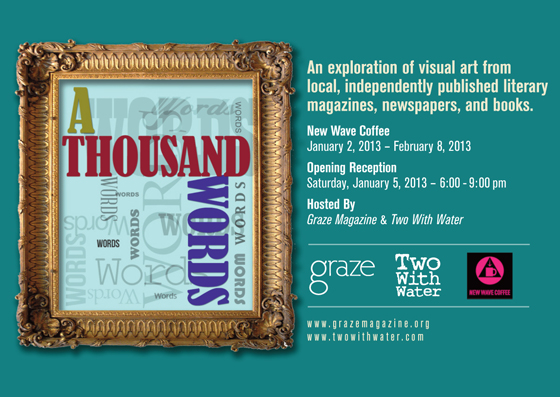 Graze Magazine co-founders Cyndi Fecher and Brian J. Solem, and Two With Water's Bobby Evers, took some time to answer my questions about the impetus for the event and what we can expect of collective efforts in the future. Next time you're in New Wave, remember, the selection of art on display represents the pooled energy of our literary community. The exhibit will be up until February 8:
Graze Magazine co-founders Cyndi Fecher and Brian J. Solem, and Two With Water's Bobby Evers, took some time to answer my questions about the impetus for the event and what we can expect of collective efforts in the future. Next time you're in New Wave, remember, the selection of art on display represents the pooled energy of our literary community. The exhibit will be up until February 8:
CG: What drew this particular group to showcase visual art?
CEF:Two With Water and Graze wanted to do a collaborative event, and one thing our two publications had in common was visual art. Once we decided to do an exhibition of the art within the pages of our magazines, it only seemed natural to fill the walls of New Wave Coffee with art from other publications. We've amassed quite a list of participating publications, which is wonderful.
CG: Do you see this as a reflection of connections between Chicago's visual and literary art communities?
BE: Hopefully. This is an attempt to showcase the beautiful images we all depend on but don't discuss. As writers and editors we talk so much about the literary pieces in our magazines and the journals of our friends and the art is sort of the unsung hero. But what is a magazine without art and design? This is a way to celebrate our artists and let them be the stars, to thank them for letting us incorporate their lovely images into our tiny presses.
BJS: I can't speak for the broader communities, but I will say that Graze has been incredibly fortunate to receive old favorites and brand new artwork from some amazing illustrators and photographers. We're so thankful to these folks for their work, and this is a way to pay it forward and get those artists some visibility in a high-traffic, high-awesome place.
Continue reading this entry »
— Claire Glass
Caroline Picard, of Green Lantern Press and Corpse Space, has been writing her superhero character, Fortuna, since 2008, but Fortuna hasn't always been confined to the page. Picard has been known to don Fortuna's superhero ensemble and set up shop on Chicago street corners, looking forlorn, or hang posters around town desperately proclaiming Fortuna's greatness. She describes Fortuna as stricken by ennui. Where the Mountain Came From is the 8th edition in her Fortuna series, out this month with Bicycle Review. 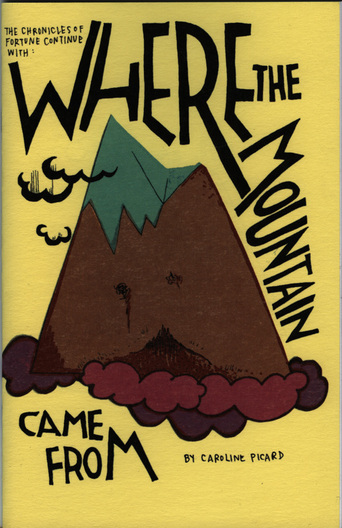
Picard took the time to chat with Book Club about the series, and about how Fortuna fits into the world we inhabit:
How has Fortuna changed or evolved since you created her?
When I made the first Fortuna comic in 2008, I was also doing performances where I'd go to public places, dressed up in Fortuna's costume, and sit for extended periods of time, without moving, trying to overwhelm myself with a static depression. I remember concentrating on stillness in public (everybody is always moving through public space)--that seemed very interesting to me, just as my attempts to emanate sadness did.
It felt like an inverse kind of peacocking, about failure or the anti-hero; obviously my costume added some dramatic flair, but otherwise I was totally unhysterical. Or sometimes, I would messily staple and tape carnival-style posters up in public, while wearing the same costume, announcing my character's greatness. It seemed funny sort of. You know, like that phrase, "You say it so often it must be true;" if Fortuna really was the greatest super hero in the world, she probably wouldn't have to put up posters that told you so. I became curious about who Fortuna was, and comics created a mode for me to reflect on a self-generated, and sort of hokey alter ego.
I was kind of embarrassed about her at first, but I liked that feeling. It was backwards--you'd think Superman would be embarrassed by Clark Kent, not vice versa. The last thing I wanted was for my family (for instance) to realize that I occasionally dressed up like a super hero to do nothing in public. Making comics about her was a way to expand and expose her mythology.
Is Fortuna's somber mood impacted by current events?
Hmmm. I hadn't thought about it, actually. Since I've been making comics with her for four or five years, she doesn't feel timely exactly. She feels more like a...I don't know, a psychic roommate. And there is so much inertia to her character; she is so passive. That said, there are real autobiographical elements she and I share; we live in the same apartment, for instance, and while I don't have a crocodile on my roof, I have lived with a wandering leak in the ceiling for about seven years. She does come out of a collective, probably American, climate though. And there is some nowness to that I think.
I can't shake this feeling that the world might end at any minute -- that the socioeconomic structure we've inherited and continue to perpetuate is doomed. Of course that's tied to the environment for me, but I find it mirrored in popular culture as well. Shows like Mad Men, The Sopranos, Breaking Bad, Boardwalk Empire all seem interested in excavating or exposing the death of male archetypal patriarchies and in every instance there seems to be an inherited tradition and the audience sympathizes with its protagonist for having to negotiate changes.
But those shows seem more about perpetuating those power structures than taking them apart. I feel those stories are actually more about reliving and propagating the past, returning to what is known and comfortable, than they are about it critique or proposing any positive future vision.
I want to tell a different kind of story. A quieter one. One with a female protagonist that isn't necessarily sexy or not sexy. I wanted to use Fortuna as a means of exploring alternate power structures, getting her to move out of a banal but exploitative job-situation. She's so much of a nobody in the world that she has the ability to explore hybridity -- her sidekick is a crocodile -- and destabilizing our anthropocentric orientation (by befriending a mountain, for instance). Fortuna follows those trains of thought and the more she leaves a traditional lifestyle behind, the more comfortable she becomes wearing a cape, the happier and stronger she becomes.
Continue reading this entry »
— Claire Glass
Books Thu Dec 20 2012
In 2005 Bree Housley lost her childhood best friend, Shelly, to complications from preeclampsia, a potentially life-threatening disorder that occurs during pregnancy. Four years later, Housley and her sister started a blog, Fifty2 Resolutions, to chronicle their attempt to live life more like Shelly, a woman, Housley writes, with a "crazy, spontaneous crush on life."
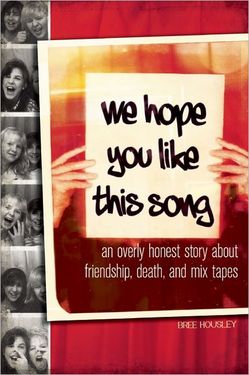 The resolutions, which include things like "woo a stranger" and "be a tourist at home", became the inspiration for Housley's memoir We Hope You Like This Song: An Overly Honest Story About Friendship, Death, and Mix Tapes, published by Seal Press earlier this year. While the blog was a sort of first-step toward healing, the book gave Housley a forum to dig deeper, to explore the meaning behind the resolutions and how they captured Shelly's spirit. (Watch the book trailer, buy the book.)
The resolutions, which include things like "woo a stranger" and "be a tourist at home", became the inspiration for Housley's memoir We Hope You Like This Song: An Overly Honest Story About Friendship, Death, and Mix Tapes, published by Seal Press earlier this year. While the blog was a sort of first-step toward healing, the book gave Housley a forum to dig deeper, to explore the meaning behind the resolutions and how they captured Shelly's spirit. (Watch the book trailer, buy the book.)
Opening with an old note written by Shelly explaining the songs compiled on a mix CD for Housley, the book is unavoidably sad. But Housley is careful to point out that its irreverence and emotional honesty make it a far cry from Beaches. WHYLTS is written in a conversational, often hilarious tone with loads of '80s and '90s pop culture references: "Shelly's 'deathiversary' is Friday of next week, January 16. So if we're going to do this, we gotta quit do-si-do-ing around the idea. We've gotta grab it by the arms and swing it around like we're Johnny fucking Castle."
Continue reading this entry »
— Lara Levitan
Author Thu Dec 06 2012
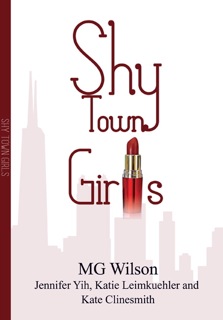 Why should New York get all the single-girl-in-the-big-city stories? Ask Katie Leimkuehler, Jennifer Yih, Kate Clinesmith and MG Wilson, and they'll tell you Chicago holds its own as a setting for urban dating adventures. The local writers have sought to capture the essence of Windy City romance in the new four-part novel series Shy Town Girls.
Why should New York get all the single-girl-in-the-big-city stories? Ask Katie Leimkuehler, Jennifer Yih, Kate Clinesmith and MG Wilson, and they'll tell you Chicago holds its own as a setting for urban dating adventures. The local writers have sought to capture the essence of Windy City romance in the new four-part novel series Shy Town Girls.
"The series evolved from the idea that every girl has these moments...anything from wine nights with friends, to laughing over the ridiculous pick-up lines guys throw our way," said Leimkuehler. "How many times have I heard a girl in the bathroom at the bar having the same conversation with her friends that I just had with mine? My co-authors and I wanted to capture the real essence of what it's like to be young, single, and dating in the city in the digital age."
And with a thriving fashion, food and nightlife scene, Chicago's Gold Coast provided the perfect backdrop for the trials and tribulations of fictional characters Bobbie, Ivy, Meryl, and Ella, four working friends (along with their sage landlady, Barbara) who share more than just a brownstone apartment.
Leimkuehler, founder of the website Conquer the Edge, says she's always wanted to write a novel series, and when the opportunity to collaborate with Wilson, Yih and Clinesmith arose, she embraced it. Though they developed the overarching storyline and an outline for each book together, each author adopted a character and book.
"[Collaboration] has made the process of writing, editing and marketing much easier because we act as a team," said Leimkuehler. "And working with my co-authors often feels more like hanging out with my friends than work--you can't beat that."
The authors funded the books through PubSlush, and the first is now available on Amazon. Enjoy cocktails, hors d'oevres, a raffle, and giveaways among funky fashions at the December 8 book launch party at Akira, 645 W. Diversey Pkwy. at Clark St. from 7-9pm. The event is free. RSVP here.
— Lara Levitan /
by Emily Schultze
Jotham Burello is the man behind the machine that is the humbly sized, award-winning independent press, Elephant Rock Books. On Nov. 12, the press is set to release an anthology of essays, Briefly Knocked Unconscious By A Low Flying Duck, unearthed from the archives of Chicago's 2nd Story. This live-lit performance group has been connecting with audiences with honest, inspiring, reach-into-your-gut-because-they-are-so-damn-good, personal narratives for over ten years.
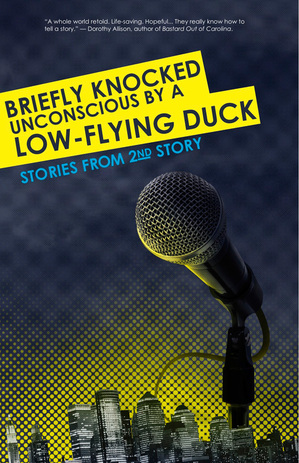 Burello lets us in on the indie publishing game, how Chicago ranks as a player, what you might consider if deciding to go indie or go big, and what it was like to put together a book with 23 different writers.
Burello lets us in on the indie publishing game, how Chicago ranks as a player, what you might consider if deciding to go indie or go big, and what it was like to put together a book with 23 different writers.
What suggestions might you have for new indie publishers, or someone thinking about starting their own press?
Don't do it. But if you're stubborn like me, pick reliable and smart partners, and the partners are the writers. I mean, you're going into business with this person. You want to have good work, but who are the people you're going to work with? They have to want to promote their work. You cannot sit back and just expect your publishing company, or publicist to run it for you. You have to have a public face. So back to you're original question; picking the right partners is vital, but so is having a little luck. And take stock in utilizing your community. I think that's really important. In Chicago there are a lot of resources.
What is your definition of success as an independent publisher?
Recently we went to the Brooklyn Book Festival. Unlike some other conferences we've done in the past, the Brooklyn Book Fest--which was enormous--had something we don't always see at academic book fairs, and that is readers. At academic book everyone has a manuscript they want to sell you, but at the Brooklyn Book Fest you had people who just liked to read. I asked everyone who approached our table, "Are you a writer or a reader?" And most kinda looked at me funny and said, "Oh I just like to read," or "I just like books." So one measure of success for me is just connecting with those readers and getting them excited about our books.
You know, as a publisher, no one wants to see me at a reading--I don't sign anyone's books. That's all the writers' stuff. It happened on an airplane just last week. I sold a copy of our new anthology to the guy sitting next to me. He logged onto Amazon and bought it right there. Then of course there's financial success. You have to have your eyes wide open as you go into it. The rewards sometimes are a little elusive when it's not measured right away in dollars and cents.
Continue reading this entry »
— Book Club
There's quite a bit on the horizon for MAKE Literary Productions in the coming weeks; events related to the release of the publication's first bilingual issue, #13 Exchange/Intercambio, will usher the Spanish/English magazine into the world on October 26 and 27. 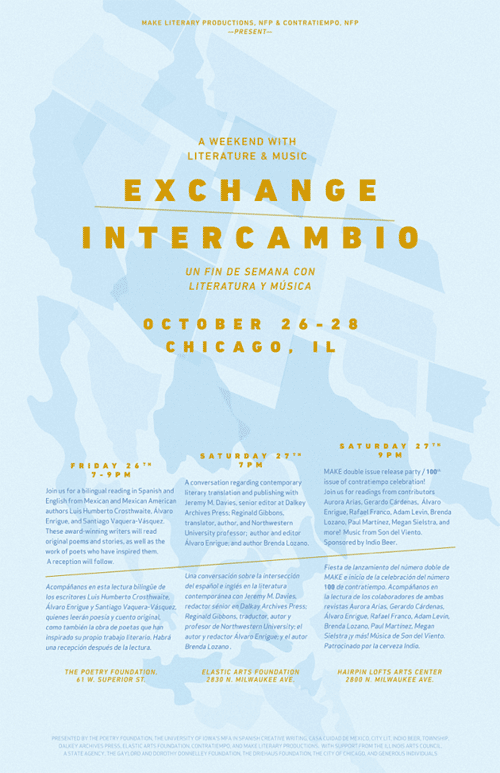
Friday's event includes a reading and reception with award-winning author Luis Humberto Crosthwaite among others. And on Saturday, MAKE will host a discussion on the art of translation with senior editor of Dalkey Archives Press, Reginald Gibbons, along with authors Alvaro Enrigue and Brenda Lozano. All that is followed by a double issue release celebration at The Hairpin Lofts for MAKE and the 100th issue of the Spanish publication Contratiempo, with readings, beer and music by Son del Viento.
MAKE's managing editor (and one of its founders) Sarah Dodson, took a few moments to discuss what it's like behind the scenes of a literary magazine -- plus, she offers an insider's perspective on what magazines are looking for when they wade through submissions.
Continue reading this entry »
— Claire Glass
"From what I can tell, our project is the biggest and most ambitious that any newspaper is doing in the United States," said Doug Seibold, president of the Evanston-based publisher Agate.
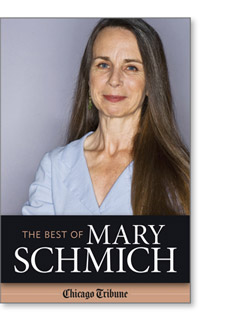
Seibold's referring to the recent collaboration between Agate and the Chicago Tribune to release a series of ebooks created from the newspaper's vast archive of news and feature stories, columns and photography. The Chicago Tribune Ebook Collection currently consists of 20 titles, among them The Best of Mary Schmich, a selection of the the Pulitzer-Prize winning columnist's favorite pieces; Charlie Trotter, the story of the world-famous chef's restaurant in Chicago; and The Rise of Rahm, which chronicles the ascent of the first non-Daley Chicago mayor in more than 20 years.
And while other newspapers, including The Wall Street Journal, the Los Angeles Times, and The Washington Post, have taken similar steps to release archived material on ebook, none have come close to the quantity the Tribune/Agate partnership has yielded--according to Seibold, they'll offer a total of 50 titles by January 1 of next year. And (perhaps best of all) they're only $4.99 a piece.
Continue reading this entry »
— Lara Levitan /
Damask Press, based in Chicago and Brooklyn, produces handmade poetry chapbooks and broadsheets, along with original art work. The press keeps design simple, with a special focus on attending to writers' vision for their work, and manages to produce thoughtful artifacts with a small staff and equally small budget.
Last week, Damask's newest project, a chapbook by poet Ariana Nadia Nash, was released and just concluded a successful kickstarter campaign. Nash's Our Blood Is Singing, Damask's fifth project, enjoyed typical attention from the press editors who work to make each chapbooks aesthetically appropriate for the work it showcases. 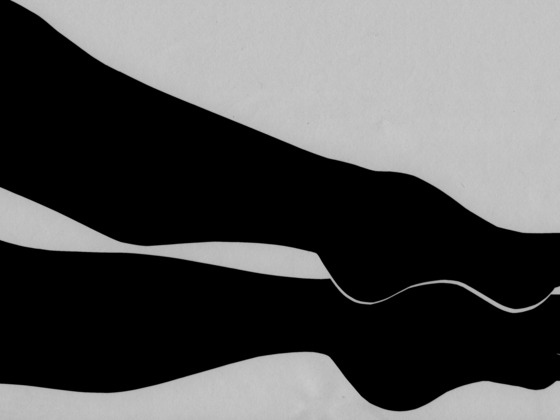
Chicago based editor and co-founder, Toby Altman, took the time to discuss the small press process with us, from fielding solicitations from authors to book design:
Can you talk about your newest publication by Ariana Nash?
The work is sort of this post confessional feminist poetry, and it's really engaged with the questions of motherhood, thinking hard about what that kind of relationship means especially from the mother's point of view. She has a book coming out this fall, but this is work she'd been developing for a while. Ariana approached us with a manuscript and we wanted to support the work she was doing.
How much editing was involved after Damask decided to work with the manuscript?
We worked with Ariana closely for two or three months, giving edits and cutting to tighten it up.
How do you approach the design process as such a small entity?
We try to produce books that are also pieces of art, designed around the author's aesthetic and intellectual concern. There's a strong link between the artifact and the poems it contains. Ariana wanted a press that would pay that kind of special attention to her writing.
Production was very simple for Our Blood is Singing. We only needed about a week to print the books. The design process, though, was quite involved. We pride ourselves on working really closely with the poets. Ariana had a lot of ideas and we wanted to make sure they were reflected in the final product. In total, it took us about a month to do the lay out and bring it the press.
Can you talk about the thought that went into designing some of your other chapbooks?
Jacob Russell's chapbook, Chronic, Chronos, Kairos, consists of set of six unbound cards in a letterpress envelope. It was printed using plates, so each etching is a little bit different, and every card has a drawing and a poem on the back.
The whole chapbook is this kind of long meditation on the ways in which time as we think of it comes unglued, or is originally unglued, so we thought it was important not to bind the poems in any one particular order in which you were forced to read them.
We try to have an art component to the book and always make sure to bring in an artist from outside the press whose work complements the poetry.
How does Damask view the question of making money as a publisher?
Our goal is always to break even--it' never been about making money. We try to get our costs as low as possible and sell all the books we need to cover those costs before we release the book officially.
Many presses will only give ten copies to their writers, but we give contributors a very high percentage of the run to have and sell. We provide the poets with this really nice thing that they can use to promote their work. The poets are the best advocates for their own work, so it's better that they get it out there.
We are not any kind of business. We're trying to figure out how to become a non-profit so we can accept grant money, so for the time being it's just us. We're creative about ways to raise money and keeping costs of books down.
How has your connection to Chicago factored into your desire to become a small publisher?
I've lived most of my life in Chicago, so most of what I know of the poetry world is based on what's happened to me here. My whole interest in doing this, and supporting the work of other poets comes from being a part of this city.
Next year we're going to be publishing at least two and maybe more Chicago poets.
— Claire Glass
Laura Pearson took on the role as TimeOut Chicago's Books Editor about a month ago, and was kind enough to take a few minutes to tell us about the job and what she's learned since starting.
As former editor of CAR (Chicago Artist Resource), Pearson is familiar with working with artists, and as a freelancer herself, she gets the importance of an event listing or a book review in the life of a writer.
What was it like coming into this role for you? Do you already have plans for the future of the Books section?
I'm taking over for Jonathan Messinger who is now web editor of TimeOut Kids. He was actually the only book editor they ever had since starting in Chicago.
Jonathon did an amazing job with his coverage in general, and especially keeping on top of exciting Chicago literary news, authors, emerging publishers, reading series and all that. He's set up that legacy and I want to continue it. We want to shine the spotlight on Chicago.
I don't just want to focus on fiction, but am planning to work non fiction, poetry, comics and short stories into the mix, too. In the past it's been mostly fiction, partially because the bulk of my review copy is fiction. Soon I'll start to solicit other things.
What have you learned about the process of getting a book reviewed since you started?
I've learned so much about pitching, just noticing my own response to books I get in the mail.
Anyone can learn the basic format stuff: You stick your press release in the book and you have to have the release date printed prominently at the top, with the specific date, not just the month. Provide information about the author and blurbs never hurt.
A huge thing is making sure you get it to the editor with plenty of time, and that means months before the book is scheduled for release. A lot of things I'm getting right now are for February 2013. It definitely helps an editor plan ahead. Also, follow up with an email but keep it relatively informal and to the point.
How does it feel opening up envelopes with all these new titles on a daily basis?
It's super fun opening the mail. Actually, it's the hardest and most fun part of the job. The sheer volume of work coming in makes it hard, but it's so much fun to see the different things being written right now.
Have you learned about many new Chicago presses since you started?
There are some new Chicago presses. Fifth Star Press, for example, just released a new book by Susan Hahn called The Six Granddaughters of Cecil Hahn.
There's also Dorothy Press, which is edited by Danielle Dutton, who I just interviewed. They make really tightly curated, pretty books
They're holding a book release and reading at the Corbett vs. Dempsey Gallery. And it's cool because the two books they're releasing are in conversation with each other but they're by two different authors.
I love that I've been discovering so many more of these literary ventures. But then, there's a weird dichotomy of working at a weekly--you find out about all these events but have less time to go to them.
Do you see the literary scene as being at all changed since the City introduced the new Cultural Plan? A part from the closure of ChicagoPublishes and CAR moving from city management to the Chicago Artist Coalition, do you see that anything has shifted?
I'm thrilled that CAR has a new home at CAC. It seems like its only going to expand and improve once the site redesign is complete.
Concerning the Cultural Plan itself, we have to wait and see. A lot of it sounds good on the page but we just have to carry on and see what happens. I want the literary culture here to be recognized, but things will continue on without the plan. It wasn't this big game changer.
I was bummed when ChicagoPublishes and the Publishers Gallery was discontinued because it's important to make our writing visible to tourists. I have hope that the city will recognize the literary scene again.
What's the weirdest literary job you've ever had?
I was a media escort at Midwest Media. Basically, you pick authors up and drive them around town to bookstores to do signings and to literary events. I met Etgar Keret, during story week. His plane was coming in late, and during in rush hour. Plus, it was in the middle of StoryWeek. Everyone was really good sports about it all, but it was little stressful. He was awesome, really nice and friendly.
In fact, when started the job I was warned that that there'd be authors I admired who would be difficult. I prepared myself but it never happened. No one was ever outwardly rude. People appreciate having someone show them the literary scene.
Contact Laura at Books@timeoutchicago.com
— Claire Glass
Hyde Park resident Blue Balliett has a new book coming out this fall under Scholastic, and although she isn't yet free to discuss the specifics of her new creation, she was most willing to tell us about her writing life. And it's one to learn from as she's found great success as a New York Times Best Seller for her first Novel Chasing Vermeer, and great success with the others, too:
How does your writing process begin?
I do a couple of years of extensive reading, poking around before each books. 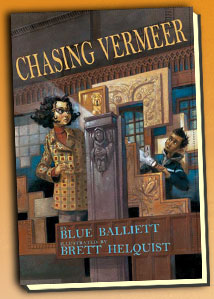
Are there things you keep in mind as you're writing that you think might benefit other writers, too?
The one thing I try to keep in mind all the time when I'm writing is to make sure every detail has a reason to be in the story. You want to show people what's important through what characters are doing; what's going on will show who that person is. It's the idea of showing instead of telling, and that's why all of your details must matter. That's always one of the hardest one of the hardest things to remember because you get excited about throwing a twinkly detail in.
Continue reading this entry »
— Claire Glass
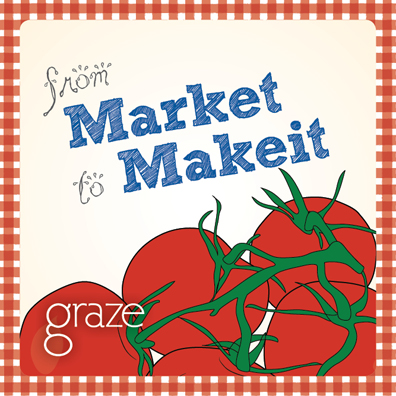 Graze Magazine is hosting From Market to Makeit, at Bang Bang Pie Shop this Sunday in Logan Square, asking that attendees bring the publication's most treasured topic to the table: food. The potluck style dinner begins at the Logan Square Farmers Market at 10am where participants meet Graze staff and can grab a free cup of Bang Bang's coffee.
Graze Magazine is hosting From Market to Makeit, at Bang Bang Pie Shop this Sunday in Logan Square, asking that attendees bring the publication's most treasured topic to the table: food. The potluck style dinner begins at the Logan Square Farmers Market at 10am where participants meet Graze staff and can grab a free cup of Bang Bang's coffee.
Graze asks that all of the food that appears at the potluck be predominantly sourced from the farmer's market, holding true to its tag line, farm. feast. feelings. Bang Bang is offering up its own contribution to the potluck for dessert, plus there's music from Poor Elvis starting at 5pm in the shop.
In time for the event, for which there are still tickets available (!!), we asked Graze founders Cyndi Fecher and Brian Solem to talk about the significance of the event, and a bit about Graze Magazine's unique perspective as well.
What was the impetus for the event?
Cyndi: Though this is the fifth event Graze has hosted in our short lifespan, it's actually the first one we came up with after dreaming up the idea of Graze. It just seemed so lovely to attend a dinner, surrounded by like-minded people, listening to music and enjoying the outdoors.
Brian: There is so much red tape to slash through to host an outdoor event unless it's held on private property. After getting a taste of Bang Bang Pie Shop's rhubarb pie this spring, I started following them on Instagram, where they posted a photo of this pristine backyard filled with bright red picnic tables. It was almost ... too perfect. When Dave and Michael and Megan actually agreed to host our event there and make a custom dessert for our guests, we went just a little bit nuts with excitement. And then to have our search for a heartfelt bluegrass band result in Poor Elvis, we knew that this vision we'd had from the get-go was going to come to fruition.
How does this capture the meaning of Graze's mission?
Cyndi: Hosting an event with such a focus on localism, down to one specific neighborhood (Logan Square), is also really energizing--to see this much activity surrounding such an important topic with global implications feels really great. Graze's unofficial tagline is farm, feast, feelings. This particular event seems to sum up those ideas quite nicely.
It seems to me that the idea of a potluck is especially appropriate to Graze. Different food preferences, histories, etc. coming together. Is there something to that, or was this the most viable option planning wise?
Brian: It's actually quite difficult to plan, since we're relying on guests to bring the central element--the food! The risk is definitely worth it. We're looking forward to getting to know a little bit about each guest through the dishes they bring. We try to bring a variety of experiences, histories, and viewpoints to the content of Graze, and in a way, we're trying to do that at a big red picnic table at this event.
What is it about food that inspires writing in your opinion?
Cyndi: Every single person on this planet needs to consume food in order to survive--its larger purpose is universal. But it also has implications for the personal, for the very specific. Because of that, food affects everything from politics, to child-rearing, to economics, to literature, to love, even. Why did the waiter's union strike in Chicago in the 1890s go largely unnoticed, and does that have implications for an understanding of labor unions in Chicago and the United States today? Probably. Do you remember what you ate on the night you decided to leave your husband? Probably. If the subject of food inspires either emotion or reason, and we believe it inspires both, it is worth writing about, and thinking about, in community.
Graze is very much a niche publication. What makes a special interest publication like this work?
Brian: On the creative side, it's worked incredibly well to be able to present a very specific prompt to our submitters. It's really edifying to see how many writers really get our about-food-but-not-about-food focus, and we've delighted in reading the hundreds of pieces we've gotten over the last four months alone. On the business side, being a special interest publication means that we have a very targeted demographic that we can attract through our events--which support the funding of Graze--and our product.
What went into solidifying your concept and making it a functional platform for writers?
Cyndi: Whew. A lot of late-night brainstorming meetings, and a lot of coffee. We're still working hard to solidify what we talk about when we talk about food. We hope we can continue to offer a space for writers who care about these topics as much as we do--art, culture, love, sex, family, economics, etc.--all through the lens of food. In many ways, food is simply Graze's organizing principle to talk about the bigger issues. We want to give writers and visual artists a chance to tease out all of that in our pages. And at our events, for that matter. We see the Graze events as a really integral part of the conversation. People read the magazine, sure, but community is also built by getting together and physically occupying the same space, which is hard to do inside the pages of a magazine. We hope that there's a platform for writers as well as non-writers, who want to take part in this larger food and cultural conversation and movement.
Do you have any advice for a writer looking to specialize in a particular topic, food or otherwise?
Brian: That's really hard to answer, especially since I would say that Graze isn't necessarily a publication designed to showcase food writers, in the traditional sense. I think the best submissions we've read bring some knowledge of food basics, sure, but there's that emotional and symbolic component of the food--the way the food is used as a literary element instead of a subject--that really excites us and feels particularly Graze-y. It makes the scientific and classically trained knowledge of food less important than an understanding of food through one's experiences and history.
But as far as food writing advice goes, in July, we hosted a two-hour-long discussion panel among eight spectacular Chicago-based food writers, and this topic came up. The moderator, Martha Bayne of Soup & Bread, observed that most of the writers onstage had come to writing through food, as opposed to coming to food through writing. Tasting Table's Chicago Editor Heather Sperling said, "Having first-person experiences can enrich your writing," and I think I agree with that. The best way to express something to a reader is to learn as much as you can about it, and that means you might need to eat fermented fish paste or slaughter a deer. All in the name of the craft of writing, of course!
Buy your tickets for $10 and show up at Bang Bang Pie Shop is located at 2051 N. California Ave. from 5-8pm with your farmer's market fare.
— Claire Glass
This year the Chicago edition of Wizard World completely reconfigured its Artist Alley layout. The concentrated block of browsable aisles from previous years was scrapped for a random arrangement spread across the furthest wall of the Stephens Convention Center, possibly in an effort to make room for all the merch and celebrities.
The convention organizers also upped the price of registration to $400, making it the most expensive Wizard World city to get a spot, out-pricing Austin, Ohio, New Orleans, Philly and Toronto. With this in mind, I ventured out to Con on its last day in town to chat with the artists who'd paid for a table along the long, lonely stretch of Artists Alley. I expected some desperation, desertion and maybe even some discounts. But what I discovered were warm smiles, sales/showmanship and some brilliant thoughts on art making.
The following encounters shed light on the insights of the unsigned, the overlooked and the independent makers of Chicago's Wizard World Comic Con.
Make Moves
Entering the convention I made b-line for the few remaining rows actually selling comics and quickly spotted the amazing work of Chicago's Sarah Becan and her table mate Eliza Frye. Chatting with them, I learned they'd managed to relocate to a better booth on the fourth and final day. They both agreed the last minute change up was the worth the higher profile spot, even though it meant the organizers now required Frye to stick impromptu pasties on her screen printed nudes. Had the two stayed at their originally assigned spot--the last booth in farthest corner of the Alley--no one would've noticed or complained.
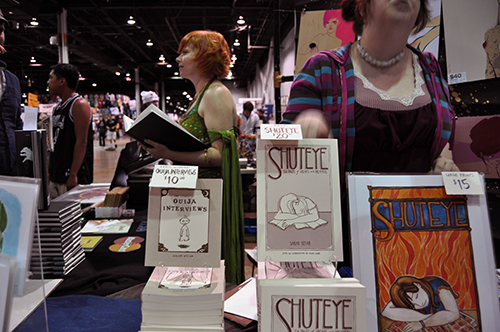
Continue reading this entry »
— Antonio Garcia
Feature Mon Aug 06 2012
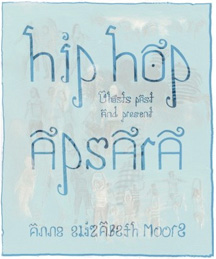 Anne Elizabeth Moore, local writer, critic, and comics maker took some time to discuss her new book Hip Hop Apsara: Ghosts Past and Present, out August 28 under Green Lantern Press. Moore is well known for her book Cambodian Grrrrl: Self Publishing in Phnom Penh, a journalistic account of Moore's experience teaching self-publishing techniques to the first generation of university women in Phnom Penh, Cambodia. She's also the creator of the Adventure School for Ladies, which she bills as an experimental graduate program in which students explore gender politics, cultural production, and related social divisions with the "top ladylike scholars in the field of adventure studies." Don't be fooled, the program is open to anybody regardless of gender identification.
Anne Elizabeth Moore, local writer, critic, and comics maker took some time to discuss her new book Hip Hop Apsara: Ghosts Past and Present, out August 28 under Green Lantern Press. Moore is well known for her book Cambodian Grrrrl: Self Publishing in Phnom Penh, a journalistic account of Moore's experience teaching self-publishing techniques to the first generation of university women in Phnom Penh, Cambodia. She's also the creator of the Adventure School for Ladies, which she bills as an experimental graduate program in which students explore gender politics, cultural production, and related social divisions with the "top ladylike scholars in the field of adventure studies." Don't be fooled, the program is open to anybody regardless of gender identification.
Hip Hop Apsara features a different type of documentation alongside the text Moore is so adept in writing; photography. The collection offers a portrait of life in Phnom Pehn after dark, primarily focusing on the dance scene, which she says captures the developing middle class in action. The essays that accompany those images grapple with notions of public and private space, mourning and remembering the past, and economic uncertainty.
Moore spoke with me about her new book as it was inspired by Cambodian Grrrl, her little known life as a photographer, and a bit about her experience with publishing houses large and small. Moore also addressed her fascination with economics and sociological study as the foundation of many of her projects, plus her propensity to make a Project out of anything that moves. This book she says is an exercise in stepping away from that, of letting the subject matter speak.
The format of your new book is unusual as it joins imagery of Phnom Penh and essays. I say unusual because it strikes me that neither element is necessarily more important than the other. How did you approach structuring the book given the duality of the mediums? Did being a comics artist influence this choice?
A lot of people don't know that I trained as a photographer -- a darkroom printer, actually -- although by the time I got my BFA I had been writing and publishing for years. And I actually had started adding text to images and printing these massive photographic prints in a series, until someone said, what an expensive way to make a book! And I was like oh, yeah, there's this other thing that I do better than this that is less time consuming and annoying than photography. Then my camera got stolen and I basically didn't get another one until I started spending time in Cambodia after 2007.
The point is: I think photographically anyway, and I write in response to images, I just usually don't make the images, or I don't make the images public. And that -- well, for one, I'm not really a comics artist, I'm a comics critic but I use the medium of comics to communicate this criticism -- but I'm good with comics because I think image and text can be equally important. Without being overly reliant on each other.
Putting the book together was pretty fun for that reason, too. Going in I had this very hard sense of, you know: it must be chronological! It must convey fact! There will be footnotes! Like a journalist, right? But as I started to construct a logic purely from the visuals, I got to tell a different kind of story. And that's really where the essay came in. It was a way of responding to the last five years I've been spending time and thinking about this amazing place without having to report or convey details. It feels really important, and I think in a way it gives a much better sense of what's so amazing about this place -- but also about people -- than anything more journalistic I've done.
Continue reading this entry »
— Claire Glass
Author Fri Aug 03 2012
by Emily Schultze
Robert Hellenga, author of six novels including his debut national bestseller The Sixteen Pleasures, will be celebrating his birthday on Aug. 5. Consider this interview a small birthday celebration of this very accomplished Midwesterner.
Hellenga teaches English at Knox College and directed two programs for The Associated Colleges of the Midwest; one at The Newberry Library, which celebrated its 125th anniversary on July 1, and one in Florence, Italy. The Newberry Library made an appearance Hellenga's The Sixteen Pleasures, published in 1995 by Dell publishing (an imprint of Random House). The novel takes place in Florence circa 1966, when the Arno River flooded the city and destroyed an immense amount of art, books, homes, and relics. The protagonist, Margot Harrington, a book conservator at the Newberry Library, flies to Florence to lend a hand. There she stumbles upon a hidden copy of The Aretino, a book of erotic poems and drawings (essentially the first Kama Sutra), unscathed in the flood, much to the chagrin of the Church. Her trip takes a sudden turn toward adventure.
Continue reading this entry »
— Book Club
Events Thu Aug 02 2012
StoryCorps is an independent nonprofit that gives average citizens a chance to share their anything-but-average stories. It is broadcast nationally on NPR's Morning Edtion and the StoryCorps "Listen Pages." Interviews are recorded, archived and aired for all to share and this month they're coming to Chicago to showcase the diversity and history of our communities and the people who call them home.
One-on-one interviews allow people to ask silly, interesting, challenging questions of an important person in their lives, and then sit back and enjoy the process of learning from the answers. Now's your chance to be a part of the storytelling. RSVP and attend one of the recording sessions when they drop anchor in town from August 15-September 16 with two locations.
Participation is free but RSVP and a credit card for holding the reservation are required. Register online or by calling 1-800-850-4406.
— Emily Thornton
Author Thu Aug 02 2012
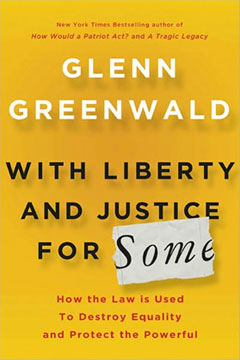
Glenn Greenwald is a political and legal columnist, blogger, and former Constitutional and civil rights litigator. He has written several books (including his newest book, With Liberty and Justice for Some), won an Online Journalism Award in 2010 for Best Commentary for his coverage of the arrest of Bradley Manning, and regularly contributes to Salon. I talked to him after his speech at the Socialism 2012 Conference, "Challenging the US Surveillance State," and we discussed his book, government monitoring in everyday life, living part-time in a foreign country, and his thoughts on Chicago's mayor.
Your speech was about what you call "The Surveillance State" - could you sum that up and give a few examples?
Yeah, it's just basically the conglomeration of government agencies and corporations which are in the business of gathering and collecting information about citizens, and what they say and what they do. And it can be anything from programs to eavesdrop on people's telephone conversations to storing their email communications to information about with whom they're communicating or [where] they're spending their money, where they go, those kinds of things.
Continue reading this entry »
— Jason Prechtel /
 Here in the Second City, there is a flourishing storytelling community formed of writers, comedians, actors, and just people with a personal tale to tell. The New York Times covered this new art form recently, and just like New York (but better), Chicago's storytelling scene is booming with shows and readings most every night of the week throughout the city.
Here in the Second City, there is a flourishing storytelling community formed of writers, comedians, actors, and just people with a personal tale to tell. The New York Times covered this new art form recently, and just like New York (but better), Chicago's storytelling scene is booming with shows and readings most every night of the week throughout the city.
Shannon Cason is a veterans of this small scene, both as a storyteller and show producer. A Detroit native, father to two daughters, writer, stand-up comic, and past Chicago Moth GrandSLAM Champion, Cason is a well established voice. I first met Cason at the Windy City Story Slam Semi-Finals back in April at the Chicago Urban Arts Society. The ease and confidence with which he told his stories is magnetic. When I sat down with Cason, we talked about storytelling as bravery. Many storytellers get the best response when they tell personal, heart-wrenching, or embarrassing stories--the stuff that makes a listener simultaneously cringe and relate--and for the most part, these tales are shared with complete strangers. "Sometimes the best stories are the ones you don't want to share," Cason said. "A lot of people can relate to the stories because you had the bravery to be vulnerable."
Cason credits Chicago's story scene to the city's "low tolerance for B.S." and the desire for something real to hold on to. The support of the Chicago storytelling community, he said, and the lack of competition compared to that felt among his comedian cohorts, doesn't hurt either. "Storytellers are just people sharing experiences." He would like to see a diversified audience and performers, as the shows getting attention are almost exclusively on the Northside.
Cason got his start in storytelling when he attended Story Club, a long standing live literature show at Uncommon Ground produced by Dana Norris. He was hooked. He, along with fellow storytelling veteran, Scott Whitehair, founded and co-produce the show Do Not Submit. DNS is a storytelling open mic, but unlike many, it is an opportunity for storytellers to experiment with a piece or a rough draft and engage a small audience. It's also an opportunity for first-time storytellers who may not be ready for a massive audience, to get up and test the waters. Cason and Whitehair connected one night in a bar and just like that Do Not Submit was born. Both have a lot of stand-up comedy experience throughout Chicago and lamented the abundance of amateur open mic nights for comedy, while storytelling open mics were only for readers and writers who had fully fleshed out pieces for performance.
Do Not Submit is hosted upstairs at Trace at 3714 N. Clark St. in Wrigleyville at 8:00pm, with sign up at 7:30pm. The next shows are set for Monday, July 23 and Monday, August 20. Check out where you can find Cason's upcoming events here.
— Melinda McIntire /
Joe Meno is back with another helping of fiction with his newest book, Office Girl. Meno, a Chicago-based author and teacher who has penned works likeHairstyles of the Damned and The Great Perhaps, will be holding a book release this Thursday, June 28. The event is sponsored by Anobium magazine and the Handshake magazine. Meno set aside time to answer some questions ranging from being a teacher to the manner of his promotion of Office Girl.
What was different for you, be it in your process, writing, or editing with this new book compared to any previous work?
Over the last decade or so, I've begun to think about what you can do in a novel that you can't do in other narrative forms. The most obvious answer is scale--novels can be more complex, more ambitious, with more characters, covering a greater length of narrative time, hundreds of years, in some cases. We've seen how the majority of contemporary literary novels exploit this idea, and how, over the course of the last 20 years, novels have become more about information--how the world works--than about characters. I wanted to write a book about the small, nearly imperceptible moments of drama in a character's life, which is something most films, television shows or stage plays usually don't try to relate, a book focused on two characters and their relationships over the course of a few weeks. The novel also employs drawings and photographs to help capture the intimate tone of the book, as drawings and photographs are usually concerned with those small, singular moments. In the end, the book resembles something like mid-Sixties Jean Luc Godard movie, which was the exact aesthetic we were trying to create.
Continue reading this entry »
— John Wawrzaszek
Author Wed Jun 13 2012
This week marks the first ever Chicago Alternative Comics Expo (for more fun, we'll refer to it as CAKE). This is the second installment of A Slice of CAKE, a two-part series spotlighting a local artist participating in the festival. For more insider perspectives attend the festival and enter the world of comics through panels, discussions and exhibiting artists including local, national and Canadian self publishers, professionals and educators.
In this interview, we welcome Jeffrey Brown, minicomics expert and Chicago mainstay. His works include autobiographical novels like Clumsy (2002) and Little Things (2008), published by Top Shelf Productions. Brown teaches once a semester at his alma matter, the School of the Art Institute. He lives in Chicago with his wife and son (a likely inspiration for his newest work, Darth Vader and Son).
As part of CAKE's programming on June 17, Brown will be leading a workshop in which he'll draw a mini comic in one hour. His new work Darth Vader and Son will be available at his expo table. I had a chance to talk with Brown about his impressions on the growth of the Chicago comics community, his thoughts on being part of festivals, and any advice he can impart on young artists.
Your presentation at CAKE, Jeffrey Brown Draws a Mini Comic, will reprise a workshop you did at Chicago Zine Fest in 2011. What do these workshops do to help build a relationship with your fans?
I had a lot of fun doing the workshop at Zine fest, it's a challenge. What's really great is being able to talk to the audience on a very casual level, show them part of my process firsthand, and let them become part of that process. I think because the situation is less formal and organized--I have everyone surround me and sit/stand wherever--people open up a little differently, ask questions they might not otherwise. It feels less like a "talk" and more like hanging out.
Continue reading this entry »
— John Wawrzaszek
This month marks the inaugural celebration of CAKE, the Chicago Alternative Comics Expo. It will be a weekend full of chances to enjoy the world of comics through panels, discussions and, of course, the expo component. The range of guests includes self publishers, professionals and educators. This column, A Slice of CAKE, will come in two parts, both spotlighting a different artist who will be exhibiting at the expo.
First up is comics artist Marian Runk, a Texas-raised Midwest transplant who has taken up residency in Chicago for over a decade now. Runk is settling in, bird watching, working in the public health field, and emerging as a name in the comics community.
As part of CAKE, Runk will be sitting on one of the many June 16 panels, discussing the topic of Women and Graphic Autobiography. She will also debut her new comic, The Magic Hedge #2, at the tabling portion of the expo. I had a chance to chat with her about her process, her new issue, and her passion for her work.
Your work draws on personal experience, focusing on simplification and reduction, which help to connect with the reader. How did you come to use this process?
I think both memoir and comics are great vehicles for introducing readers to characters and topics they don't always think they want to meet. My first year of grad school, I made a life-sized comics panel that expressed anger at my mom's unwillingness to talk to me about my queer "lifestyle." Among other things, there was a painting of a lesbian orgy hung up on the wall, some text coming out of a telephone that said "deal with me," and a comfy chair. One of my (straight male) classmates said "I sat in the chair and thought about all the things my family disapproves of in my life." That really illustrates why I make autobiographical comics -- to connect with people at a personal and emotional level. Humor is that other huge thing that can disarm your reader and allow this to happen. Laughing with someone allows you to share their experience for a moment.
Continue reading this entry »
— John Wawrzaszek
 Gary Krist's latest book City of Scoundrels:The 12 Days Of Disaster That Gave Birth To Modern Chicago was released April 17, 2012. He is the author of The White Cascade, and has written for the New York Times, Esquire, Salon, and the Washington Post Book World. His book covers the 12 days in Chicago in 1919 when a blimp crash in the Loop, the murder of a little girl, transit strikes, and a flurry of race riots sent the city into frenzy.
Gary Krist's latest book City of Scoundrels:The 12 Days Of Disaster That Gave Birth To Modern Chicago was released April 17, 2012. He is the author of The White Cascade, and has written for the New York Times, Esquire, Salon, and the Washington Post Book World. His book covers the 12 days in Chicago in 1919 when a blimp crash in the Loop, the murder of a little girl, transit strikes, and a flurry of race riots sent the city into frenzy.
In the early 1900's things were changing across America as a whole. Why did you choose Chicago as a focus for this change?
I'm really interested in big cities and how they change over time, how they evolve, because it's always a very tumultuous, almost Darwinian process with groups being in competition with each other. I wanted to look at it as almost a test case of the whole American idea of can we build a Democratic society based on this collection of people of all colors, races, creeds, nationalities. And so the question was, could this group of people from all over the world come together and put aside racial hatreds, put aside ethnic hatreds, and cultural differences, and build the city into an economic powerhouse. We know now that the answer is yes, but there were times as in 1919 when it looked like the experiment was not going to work.
Your previous book The White Cascade focused on the early 1900's as well. Is there a particular fascination with this time period?
I think of this era, the Progressive Era, the first two decades of the twentieth century as really being the adolescence of modernity. Technologically I think it was an adolescence, and also socially. I think cities were growing and they were growing faster than they could really adapt. That's what really interests me about this era. It really seems that change is happening so quickly and our ability to control the change has not gotten there yet so you get all kinds of excitement.
Why did you decide to make Chicago's mayor William Hale Thompson, or Big Bill as he was known, the focus of your book?
First of all, he is God's gift to any narrative history; he is just so colorful, so corrupt, with the big cowboy hat, and he was the leader of the city. I think he represented the force by which the city's various groups were going to have to accommodate each other. He was a master at getting groups that should not be on the same side on the same side. A city has to change, and his changes of course were superficial, more often than not.
Big Bill had his good and bad parts in shaping Chicago. But, what part do you think Big Bill played during those 12 days?
I think the mayor's performance was bad during the crisis, but he really aced the recovery from the crisis. Because of the resolution of both the transit strike and the race riot investigation by Governor Lowden and by the Democratic States Attorney-they both just made a hash of the recovery, and Big Bill was able to use the resulting outrage to build a powerbase. So this created another upset among commuters and people who have to get to work. Big Bill was able to take advantage of that with his "save the five cent fare." So really the crisis harmed him, but the recovery from the crisis really brought him back to the fore and he was able to dominate Chicago politics for most of the '20s.
How do you think Big Bill's reaction or lack there of, affected how people in Chicago reacted to these 12 days?
He was a charmer and he was very interested in distraction, so he was able to distract people and say, look the Chicago Plan ordinances. He arranged for that ceremony to sign one of the important Chicago Plan ordinances on the day the riot ended. So, he knew that what he had to do was get peoples' minds on something else. He was a master of doing that.
Your book has some pretty extensive historical sources. How difficult was it to find the testimonies and witness accounts of these 12 days?
I spent a lot of time at the Chicago History Museum research center, the Newberry Library, and reading the newspaper microfilm. I'm always looking for specifics because I'm a narrative historian; I have to bring scenes to life. I'm always looking for somebody describing the scene, actually quoting what was actually said, what the room looked like, so I'm constantly looking for that kind of detail.
That must be difficult at times.
It is, but, having written novels and short stories, fiction, I was really sensitive to, I have to bring this alive and the thing you need to bring it alive is concrete detail. And since you can't really make it up, I have to find that in a historical record.
When you started doing research for this book, what findings inspired you the most? And how did this shape the way you wrote the book?
I was most inspired by the whole idea of the plan of Chicago. This idea that you can take a city that had grown up very chaotically and marshal the support in the city to do this thing, to remake the city from top to bottom to make it better.
In the end do you think Bill Big helped shape Chicago to make it what it is today? And if he did, what part did he have in it?
I think he was both good news and bad news for Chicago, perhaps more bad news than good news. He allowed crime to flourish in the city, which gave Chicago this reputation as a gangster town that it still really has in certain places. When you go to Europe and you say "Chicago," they say "Al Capone." People have called him the worst mayor ever and there is a lot of justification for that. But, I do think that he really did imagine himself as a builder, "Big Bill the Builder" as he called himself. So, I do think that a lot of the architectural gems that make Chicago such a showpiece today really came about under Big Bill's administration, so you have to give the guy credit for that.
— Julie Zarlenga
Open Books is more than just a bookstore, for many reasons. Here's one reason, which you may not expect: this winter, two separate marriage proposals have taken place among the stacks.
Kevin Elliott, the bookstore's manager, talked with Gapers Block about what makes Open Books a great proposal venue.
Why do you think Open Books is a great place for proposals?
It's a home to true book lovers, and there is an inherent romanticism in books--they can take your mind and imagination to very personal and intimate places. We aren't a store with dusty stacks and piles. There are cozy couches in the lounge, vibrant colors, and soft lighting that all work together to create an intimate setting that really draws people to the store. When you walk into the store, you immediately feel this sense of joy, awe, and comfort, the same feeling you get when you're around your significant other.
When you get engaged, you're getting ready to begin a new chapter with the person you love. You may not know what's next, but you are excited to find out. That, mixed with the magical atmosphere of our bookstore, definitely makes for an intimate, symbolic place for engagement.
Continue reading this entry »
— Ruthie Kott
News Wed Oct 19 2011
This fall, Chicago's Logan Square neighborhood will get a new bookstore. Uncharted Books, taking over the retail space of a former shoe store, will be a general used bookstore focusing on literature — no airport fiction allowed. You'll also find vintage classics, and an emphasis on local Chicago interest, biographies, memoirs, history, and women's studies.
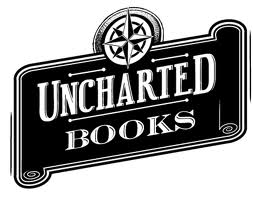 Uncharted is the brainchild of Tanner McSwain, a transplant (ultimately) from a chicken farm in Albemarle, NC, who keeps finding himself in Logan Square — which, he feels, is "the right neighborhood at the right time. It's on the cusp of booming and becoming a destination."
Uncharted is the brainchild of Tanner McSwain, a transplant (ultimately) from a chicken farm in Albemarle, NC, who keeps finding himself in Logan Square — which, he feels, is "the right neighborhood at the right time. It's on the cusp of booming and becoming a destination."
Not one to disparage any of his fellow used bookstores (all booksellers are "on the same team", after all), and being a loyal fan of favorites Myopic, Women & Children First, Powell's and the Seminary Co-op, McSwain still feels that Chicago, and particularly his neighborhood, really needs a more general used bookstore. His niche is establishing a store without a niche.
The name of the bookstore comes from his hope to establish a place that allows adventure and exploration. "I'm definitely sailing into unknown territory here, and though I have some very specific visions for the direction of the store, it's also a bit of a blank page."
While he seems to be doing well on amassing titles to sell (currently, he has 8,000 books, and he hopes to reach 12,000 by opening), the transformation of the location itself into his vision for Uncharted seems dangerously far from its goal.
Retail horizontal grills — the kind you hang hooks for merchandise on — still cover what will eventually be beautiful, exposed brick; a plywood sub-floor waits to be transformed into either hardwood or nice laminate; the suspended ceiling, composed of those square, acoustic tiles, will be torn down, revealing the exposed pipe work above it.
McSwain is optimistic he'll be able to enact these renovations, perhaps by Thanksgiving, and if not, by Christmas — and what will be left is the feel of an old world European pub; dark woods, cozy.
Uncharted Books will be much more than a bookstore, however. It will double as a community center, offering literacy programs, writing classes, open mics, and readings. His goal, of course, is to "encourage people to create art and literature and not just consume it." A resident of Logan Square for many years, McSwain already has roots there, but he wants to make those roots deeper.
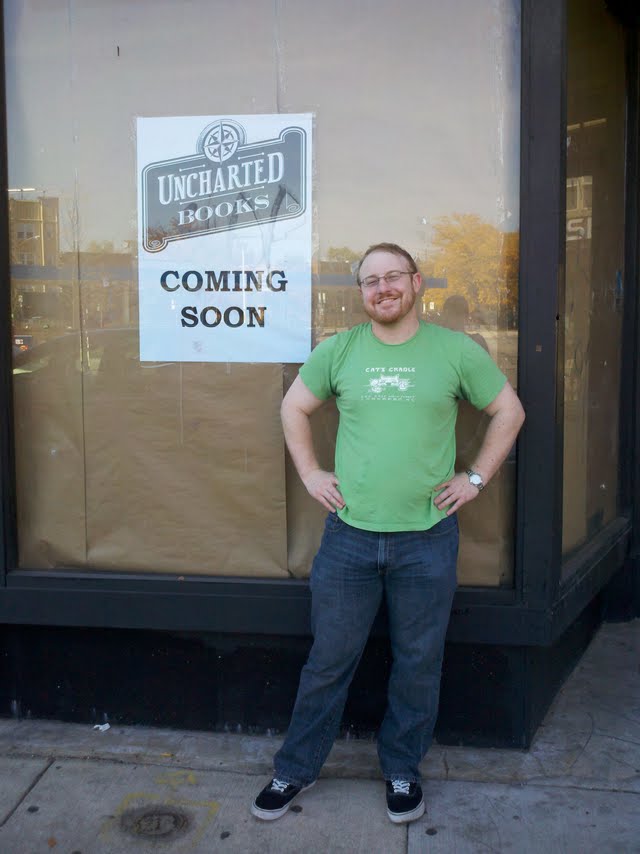 McSwain, who is also a licensed massage therapist, has a background in publishing. A former employee of indie publisher Agate as well as McGraw-Hill, he's optimistic that independent bookstores, despite all economic woes, are "doing just fine". His research indicated that small, used bookstores are "borderline recession-proof," due to their low start-up costs and their ability to tap into people's "recession-era need" for thrift.
McSwain, who is also a licensed massage therapist, has a background in publishing. A former employee of indie publisher Agate as well as McGraw-Hill, he's optimistic that independent bookstores, despite all economic woes, are "doing just fine". His research indicated that small, used bookstores are "borderline recession-proof," due to their low start-up costs and their ability to tap into people's "recession-era need" for thrift.
Of course, there's no harm in asking for a little help to get things started. Uncharted Books, which will buy your used reads for "more than you think," is also happy to accept donations. That, or you can check out their Kickstarter campaign.
Details:
Uncharted Books
Opening Fall 2011
2630 N. Milwaukee Avenue
— Megan E. Doherty
Jeffrey Eugenides would like to make one thing clear: his new novel, The Marriage Plot, is not itself an attempt at a marriage plot.
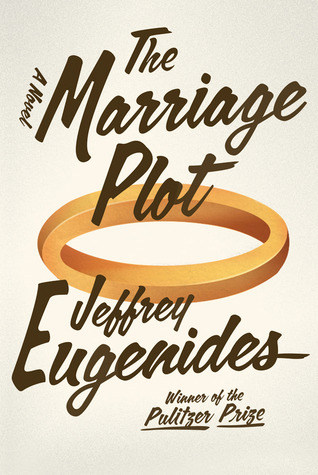 The story follows three young adults, all graduating from Brown in the early '80s, who try to figure out life and love. Madeleine Hanna finds herself loving Leonard Bankhead (exciting, unstable) and being loved by Mitchell Grammaticus (sensible, spiritual). Rather than simply give us a new spin on a Jane Austen novel, Eugenides wants to highlight just what it does to people to read such books. Madeleine, an English major who falls in love with Victorian literature at a time when semiotics tries to deconstruct the very idea of love, struggles when reality falls far short of the ideal.
The story follows three young adults, all graduating from Brown in the early '80s, who try to figure out life and love. Madeleine Hanna finds herself loving Leonard Bankhead (exciting, unstable) and being loved by Mitchell Grammaticus (sensible, spiritual). Rather than simply give us a new spin on a Jane Austen novel, Eugenides wants to highlight just what it does to people to read such books. Madeleine, an English major who falls in love with Victorian literature at a time when semiotics tries to deconstruct the very idea of love, struggles when reality falls far short of the ideal.
"It wasn't a question of trying to write a marriage plot so much as to show how the marriage plot functions in people's heads," Eugenides said. "This book was very much about the extent to which what we've read and what we've read about love will influence our own choices in love and really determine a large part of our fate."
Continue reading this entry »
— Megan E. Doherty
Jacquelyn Mitchard knows how to do research.
A reporter for twenty years before authoring her first novel, The Deep End of the Ocean, Mitchard applies her journalist's obsession with fact-gathering to the process of writing fiction.
"You get a Tupperware box, the big kind, the kind you put sweaters in, and you do all the interviews in the world."
While it may represent a tremendous investment of time and energy, it's also an insurance policy.
"I [take] copious notes, just to make sure I [don't] get anything wrong — [even] for two paragraphs. I do way, way more research than is warranted, and I always will. People can say that this is a really stinky book, but they can't say that stuff is wrong. Ever."
Continue reading this entry »
— Megan E. Doherty
My interview with Elizabeth Berg was simply not meant to be.
What was to be a nice chat in Oak Park turned into my sitting in Oak Park, glumly drinking a no longer enjoyable pumpkin latte and brooding over my rotten luck.
No Berg. And me without her phone number.
After some unfortunate pestering of various publicists, I learned that my interviewee mistook my name on her calendar for an author (not really, I'm afraid) who she wanted to hear give a reading (alas, but one can dream). Being quite busy that day, she thought, "skip it."
Needless to say, when an intrepid publicist finally reached her, she apologized profusely for the error, and was happy to answer some of my questions via email.
I give you: A Brief (Email) Interview, wherein we discuss her as a writer, and her new book, Once Upon a Time, There Was You.
I understand you were a nurse for a while - when, how and why did you make the transition to writing? What is the writing process like for you - if you could describe how it feels, what it does to/for you, etc.
I was a nurse for ten years. I had always written, and I'd always gotten a lot of encouragement from friends and teachers who said, "You should be a writer!" So I decided to give it a try--mostly because I wanted to have a job where I could stay home with my daughters. I began sending out personal essays to magazines, though I also kept working as a nurse. But at some point, I saw I could make my living as a writer and decided to stop working as a nurse. As for the writing process, it's a joyful mystery. As E. B. White once famously said, I don't like to look under the hood.
Which character (and/or book) do you see the most of yourself in? The least?
Most: Katie Nash. Least: All the others.
How have you changed as a writer, or how has your style changed, since you started? If it has!
I don't think I have changed much, really. I'm still writing about the same issues: love, loss, the meaning of home and family, the importance of friendship, the fragility of life.
[SPOILER] Did you know going in that John and Irene wouldn't get back together? Or, at what point did you "learn" that they wouldn't, while you were writing?
I didn't know, going in. I wrote it to see what would happen if two people who were once with each other every day but now were estranged, were forced back together. Would they remember what they used to love about each other? Would they feel justified in having made the choice to separate?
Food was a huge presence in this book, and has been in others (e.g. The Day I Ate Whatever I Wanted) - tell me about food. What is it about food that makes it so evocative/provocative?
Oh, well, it can serve as metaphor for everything. And it's a regular presence in everyone's life: we all have to eat. What/how/when we eat tells others a lot about us.
In the early scene between Irene and [her friend] Val, when she's about to ditch the wedding, her father peeks in to say it's time and she seems to instantly change her mind, or find some sort of resolve to go through with it. What happened there? What happened between "I'm not doing this" and her response to Val's question, "no"?
She's just so ambivalent. She knows John is a good man, and her father's voice tips her over into the side of oh, I'll just do it. And she was affected by Val's words, too: if you do this, it's permanent. Everything between John and you will be over.
You have three paratextual quotes that start the book off - the first two are really self-explanatory. Tell me about the third one, in relation to the story.
For me, that quote simply acknowledges the fact that for some people, love is absolutely terrifying. And often not possible. They can't handle it. There is something buried deep inside them that they won't let anyone touch, and that makes it impossible for them to enjoy the kind of free fall into trust that love requires.
To learn more about the recent literary event featuring Berg and fellow author Jacquelyn Mitchard, click here.
— Megan E. Doherty
Books Sat Sep 17 2011
On Thursday evening, bibliophiles had an opportunity to attend an informal meet & greet with two authors, both with Chicago roots: Elizabeth Berg (Once Upon a Time, There Was You), now an Oak Park denizen, and Jacquelyn Mitchard (Second Nature, a Love Story), a Chicago-to-Wisconsin transplant, dished with Tribune literary editor Elizabeth Taylor to a room full of women (and perhaps two men, give or take).
The tone of this installment of the Tribune's Author Talks, part of an effort to "extend journalism to a live format," was set from the start. In her introduction, Taylor relayed an anecdote about her husband, who apparently responded to learning who the chosen authors for this particular event were by saying, "why don't you just sit around drinking wine and talking in your pajamas?"
Although she was quick to add her husband's respect for these authors, there's much to be said for the comfort and intimacy (not to mention, honesty) of pjs and a bottle of wine. Throughout the evening, the audience (myself included) was so comfortable that I'm not sure we weren't dressed more informally than we actually were. If the Trib's goal was to hold these events as intimate "salons", where the conversation on stage feels personal, then they succeeded.
Berg and Mitchard began, obligingly, by sharing their "Oprah Stories" - both have had books chosen for the infamous book club, with Mitchard's The Deep End of the Ocean being the first ever. Mitchard, who got a testy, fourth phone message from Oprah asking her to please have the courtesy to return her call, initially thought the whole thing was a joke.
To justify juxtaposing these two stories together, they obviously need more in common than Lady O - which they most certainly do. Both books explore what happens after tragedy, and how people cope - be it the personal tragedy of a divorce and worrying about your child, or the medical risk of transplant rejection. Both, said Berg, "acknowledge sorrow, but offer comfort."
That gift of comfort, perhaps, has gotten them some stern reviews, most of which focus on writing and themes that are allegedly overly sincere and sentimental. Unsurprisingly, this sort of criticism tends to follow women authors who write about the lives of women. It is a testament to the organizers of this event that they don't succumb to the erroneous conviction that "women's literature" (aka, "chick lit") is thereby relatively uninteresting and unimportant (check out this interview with author Augusten Burroughs, who sees truthfulness and honesty where others see maudlin).
While many writers may be "deeply insecure" about bad reviews, Berg and Mitchard seem to take it in stride. "Good criticism finds places [I've] been dishonest," Mitchard admitted. Operative word being "good" - some detractors may well be railing against anything resembling a happy ending.
"Not every book ends like a Cormac McCarthy book," Mitchard continued, "with a guy eating an egg and thinking about the end of the world."
Maybe McCarthy should write in his pajamas more often.
— Megan E. Doherty
Feature Mon Aug 15 2011
If you like poetry, entertainment, and top hats, then the Chicago Poetry Brothel is for you. Tucked away in Thalia Hall, in private rooms in Ristorante al Teatro (1227 W 18th St), the basement bar has been turned into a Victorian brothel by the brothel's madam--Madam Black-eyed Susan--her "poetry whores," and the good doctor (there to supply laudanum for the poets with a case of the nerves). After paying the entrance fee ($5 if you're dressed in Victorian period clothing, $10 if your Victorian period wardrobe is at the cleaners), grab some wine or whiskey at the bar, and wait for the show to start.
The Poetry Brothel typically follows a standard format: After patrons get the chance to settle, Madam Black-eyed Susan introduces her poets with a few descriptive sentences about each, and each poet gets a chance to read a bit of their work to entice the crowd. Once everyone has gotten just a taste of the evening's finest lines, the poets mix and mingle with the crowd, peddling their poems, every so often taking the floor again to tease the patrons with more of their work. Because for a mere $5, you can purchase a token that gets you, not only the poetry whore of your choice, but an intimate reading with that poet, inside a velvet tent, complete with chairs, a table, and gold tassels. In this private space, the poet will recite anything the patron wants--be it the poet's own work or a poem the patron has in mind--on any topic. Being face-to-face and knee-to-knee with the poet is a very personal experience--ask the poet anything you want about the piece, ask for it to be read it again, ask pretty please for more than one poem. You might think that you'll get the same kind of work from each poet, which is definitely not the case. The poetry whores each have their own style that ranges from sultry jazz (Serafine LaCroix) to dark and haunting (August Rose). Plan ahead--check them all out so you can come to the next brothel prepared. And if you're interested in more than one, feel free to purchase more than one private reading!
But poetry isn't the only entertainment--the brothel also invites guests and musicians to showcase their talent. At the August 6 Poetry Brothel, Pearl Pistol performed her alluring vaudeville burlesque show, and the White City Rippers kept everyone moving with what they call their "old-timey mad-scientist steampunk music." (The October brothel will feature Karen Abbott, author of Sin in the Second City, and The Loneliest Monk, master of the electric cello.)
Intrigued? You should be. By the end of the night (the Poetry Brothel parlors are open from 8pm to midnight), you may leave with the poetry whores' books (on sale throughout the evening), and you may leave a little tipsy (the bar is open all four hours), but you certainly won't leave uninspired and unimpressed. And to tantalize you just a little bit more--see what Madam Black-eyed Susan herself has to say about the brothel, her poetry whores, and much more after the jump.
Continue reading this entry »
— Emily Wong
News Thu Jul 14 2011
If independent bookstores have been battered by economic forces, the same goes all the more for those with a specialized focus -- so says Linda Bubon of Chicago's Women and Children First, reportedly only one of nine feminist bookstores left in the country. Robin Amer of WBEZ interviews Bubon for an inside perspective, and you can read the whole conversation here.
— Megan E. Doherty
Books Fri Jun 10 2011
 Death at Pullman: An Emily Cabot Mystery
Death at Pullman: An Emily Cabot Mystery
Frances McNamara
Allium, 2011
Death at Pullman is the third book in Frances McNamara's Emily Cabot series. Cabot, a heroine/detective in 1890s Chicago, finds herself in the center of the Chicago Pullman strike of 1894 when she goes to the Pullman factory town to run a relief center and ends up involved in the murder investigation of a striker. Based on the real Pullman conflict that took place nationwide, McNamara's novel weaves together fact and fiction to create a murder mystery that places the reader right in the midst of this important part of Chicago history.
GB: So, which came first - discovering the history of the Pullman strike or your idea for the fictional events/characters?
FM: The characters in Death at Pullman are a part of the series about a young woman who comes to Chicago to do graduate work in sociology at the University of Chicago and meets a police detective who mentors her. So the characters were there, and the stories are set against the backdrop of big things in Chicago. The first book has the Columbian Exposition, the second has Hull House and the smallpox epidemic of winter 1893. When I realized the Pullman strike was during the summer of 1894, and that Hull House helped with a relief station [in the second installment, Emily Cabot finds work at Hull House], it seemed the place for Emily to go.
How long do you spend researching a historical topic before you begin writing? And you may have to not only research the specific topic but also the era - in this case, the 1890s. It sounds like such a daunting task...
I work at the University of Chicago Library. Since the university was begun in the 1890s, and much of the architecture and institutional atmosphere I encounter every day are based on the plans and philosophies of the early members of the university, it's easy to be drawn in. For the Pullman story, I began researching by reading newspapers of the time on microfilm at the Chicago Public Library. Later, I was able to take advantage of subscriptions to digitized versions of the newspapers that we have at the university library. This is fiction. The research involved does not match up with the type of research a real historian does, but the combination of the continued existence of the physical places, memoirs, and newspapers of the time -- as well as access to all the resources of a great research library -- make it not such a daunting task. I have toured Pullman and gotten much useful information from the folks down there also.
Obviously, the language and the dialog were more formal during this time. Do you find it difficult to write this way? To "keep in character," so to speak?
It's a balancing act. If you use our common phrases and styles of speech, it really does not fit the time. On the other hand, if you really wrote in the style of that time it would be turgid. I think it is important to realize that some ways of thinking, impacted by psychology and technology, just would not be within the realm of thought for people at that time, so you shouldn't make them think, talk, and act that way. On the other hand, for the characters to be sympathetic and be considered people we can identify with, they can't be too strange in how they think and act. So I hope I have managed to balance that. The language is meant to give you the flavor of how people would think and act at that time. Just like the buildings and clothing would be different, so would the speech.
You grew up in Boston - and as the daughter of a police commissioner! I can only imagine that must have been exciting at times. What drew you to writing about Chicago history, rather than Boston history?
Living in Chicago drew me to writing about it. Note that my character comes from Boston. When you live somewhere you take it for granted. When you move somewhere new you learn about it. There are lots of things about Chicago that are like Boston, but it is a great city with its own character. I could definitely write about Boston, but living in Chicago and visiting places like Hull House and Pullman -- not to mention working on the campus of the University of Chicago -- makes you wonder what would it be like to live here at the time of the people who left such a mark on the city. That's a good start for a story.
Continue reading this entry »
— Emily Wong
With the release of his first full graphic novel Quarantined (reviewed here in depth), I sat down with writer Michael Moreci to discuss the genesis of his work, his influences, and what's on the horizon for this up-and-comer.
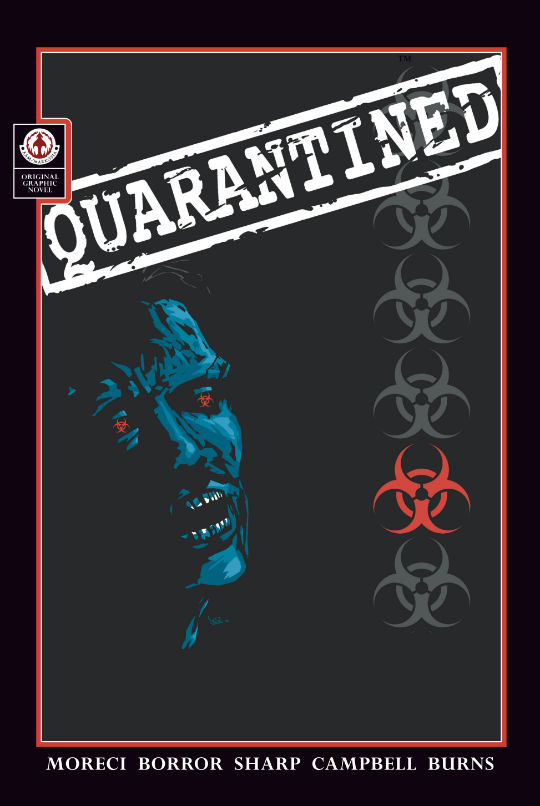
My first question would have to be, where did the inspiration for this graphic novel come from?
Inspiration is a funny thing. I think as a writer, you have to be more pragmatic with your work than anything. Ideas are fleeting things--every writer has them. The challenge is being able to sit down and put in the work required to develop those ideas, and to then discover which work and which don't. Some ideas -- good ideas, at times -- are just dead-ends, and it's hard to let them go.
Specifically to Quarantined, it was one of those concepts kicking around my head, had been for a while. And when it came down to having a proper vehicle for telling the story I wanted to tell, the concept behind Quarantined was a prefect match. I wrote the book, after all, in a relatively different time -- still under the Bush era, closer to terror levels, corrosive paranoia, all those things. So a book about a lurking threat in an isolated location made sense to me. It still does. I wanted to do what [John] Carpenter did, what [George] Romero did: analyze society through a microcosm. I can't stand all these apocalyptic stories that involve the F.B.I. and the president and global agencies -- it feels so absolutely inhuman. There's nothing to connect to. I wanted to isolate a cast of characters, to have them be at the same time very real and represent the inherent conflicts of society.
As for zombies, well, that's simple. They're a lot of fun, and there's so much you do with the genre. I grew up on horror movies; my older brother was a big fan, and I was introduced to stuff like Nightmare on Elm Street and Halloween at a very early age. It's in me to tell that kind of story -- I love being scared, and I love being able to mix in some brain candy with the thrills.
You touched on a proper vehicle for telling this story. To spin that a bit, why did you opt for paper printing? Was Quarantined always envisioned as a hard copy graphic novel or did you tinker around with the idea of web publishing at all?
I always saw Quarantined as a book, from the start. One of my favorite things about the comics form is serialized storytelling. Unfortunately, it's getting harder for that type of storytelling to exist. There's lots of talk within the comics community about sales, publishing models, inundation of weekly books, price points, etc, and they are all striking close to the heart of the monthly pamphlet. And while I think there is cause for concern, my main difficulty with the monthly pamphlet is staying current. Let's face it: We live in a hyperactive, dizzying culture. There is such a wealth of entertainment -- good entertainment, too -- and our attention span isn't what it once was. Comics shipping isn't like, say, AMC TV where you know a show will be on every Sunday for 12 straight weeks and then break; comics come out monthly, they're oftentimes late, and in the span of one month, so many other things have happened. If I read Daredevil one month, I probably read 20 more different comics before the next one comes out. When I sit down to read the latest Daredevil, then, I'm often wondering, "What the hell is going on is this book again?" That's why trades are becoming way, way more appealing to me. You get a complete arc, something whole and easy to reference when the next one comes out. Though, admittedly, a 25-year habit is making it tough to break away from my beloved monthlies completely.
As for digital, I'm all for it. There's a lot I still need to learn, but I'm excited about the prospects digital offers, in terms of new readers the technology can bring in and the extras you can add (Double Feature Comics, in fact, layers a great "director's commentary" component to their content, which I love). I have my own digital series, titled Reincar(Nate), being released with Viper Comics in the fall -- and we have a lot of fun, interesting bonuses that we're going to be adding with each issue. As a creator, I'm thrilled; if people are investing their time and money into my work, I want to give them everything I can. Combine technology, willingness, and the subtraction of print costs, and there are so many opportunities to do just that.
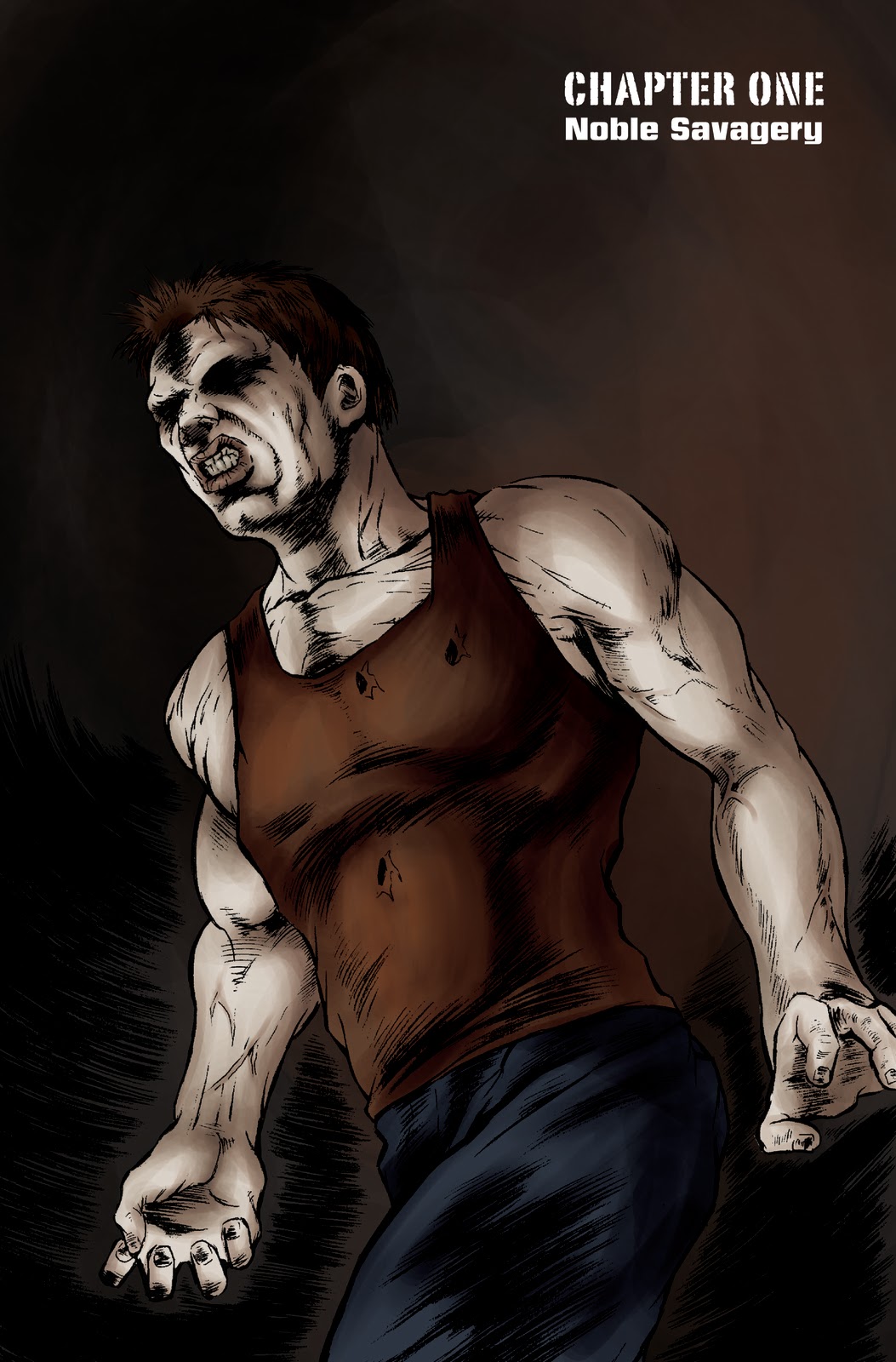
Continue reading this entry »
— James Orbesen








 The live lit show
The live lit show  The most interesting investigator in Chicago's strong tradition of crime fiction isn't a detective, a lawyer, or even a journalist. Mark Angelotti, the wisecracking protagonist of
The most interesting investigator in Chicago's strong tradition of crime fiction isn't a detective, a lawyer, or even a journalist. Mark Angelotti, the wisecracking protagonist of 
 Set in the farthest reaches of Chicagoland -- a fictional small town called Midway in the cornfields of northwestern Indiana -- Little Pretty Things centers on a bizarre murder at a roadside motel, when a maid named Juliet Townsend discovers the body of her best friend from high school. It's creepy, clever, and full of surprises, the kind of book you stay up all night to read in one sitting.
Set in the farthest reaches of Chicagoland -- a fictional small town called Midway in the cornfields of northwestern Indiana -- Little Pretty Things centers on a bizarre murder at a roadside motel, when a maid named Juliet Townsend discovers the body of her best friend from high school. It's creepy, clever, and full of surprises, the kind of book you stay up all night to read in one sitting. It takes great skill and dedication to be recognized as one of the top names in any field. For cartoonists,
It takes great skill and dedication to be recognized as one of the top names in any field. For cartoonists, 
 Before the industrial revolution, only an affluent elite could afford to have libraries in their homes. Today we enjoy public libraries precisely because technological advancements made the mass production of books feasible, affordable. Now, technology has once again fostered a possible next step in library advancement: Hoopla Digital.
Before the industrial revolution, only an affluent elite could afford to have libraries in their homes. Today we enjoy public libraries precisely because technological advancements made the mass production of books feasible, affordable. Now, technology has once again fostered a possible next step in library advancement: Hoopla Digital.
-thumb-1212x808-14643.jpg)





 "You should always have a phallic microphone," joked
"You should always have a phallic microphone," joked 


 "It was like swimming with a whale shark."
"It was like swimming with a whale shark." Good spies aren't born; they're made. Such is the case for the genetically altered spies in The Orphan Trilogy, a series of international conspiracy thrillers by New Zealand authors
Good spies aren't born; they're made. Such is the case for the genetically altered spies in The Orphan Trilogy, a series of international conspiracy thrillers by New Zealand authors 



 I had never read any of Chicago native
I had never read any of Chicago native 



 Graze Magazine co-founders Cyndi Fecher and Brian J. Solem, and Two With Water's Bobby Evers, took some time to answer my questions about the impetus for the event and what we can expect of collective efforts in the future. Next time you're in New Wave, remember, the selection of art on display represents the pooled energy of our literary community. The exhibit will be up until February 8:
Graze Magazine co-founders Cyndi Fecher and Brian J. Solem, and Two With Water's Bobby Evers, took some time to answer my questions about the impetus for the event and what we can expect of collective efforts in the future. Next time you're in New Wave, remember, the selection of art on display represents the pooled energy of our literary community. The exhibit will be up until February 8: 

 Why should New York get all the single-girl-in-the-big-city stories? Ask
Why should New York get all the single-girl-in-the-big-city stories? Ask 






 Anne Elizabeth Moore, local writer, critic, and comics maker took some time to discuss her new book
Anne Elizabeth Moore, local writer, critic, and comics maker took some time to discuss her new book 

 Uncharted is the brainchild of Tanner McSwain, a transplant (ultimately) from a chicken farm in Albemarle, NC, who keeps finding himself in Logan Square — which, he feels, is "the right neighborhood at the right time. It's on the cusp of booming and becoming a destination."
Uncharted is the brainchild of Tanner McSwain, a transplant (ultimately) from a chicken farm in Albemarle, NC, who keeps finding himself in Logan Square — which, he feels, is "the right neighborhood at the right time. It's on the cusp of booming and becoming a destination."  McSwain, who is also a licensed massage therapist, has a background in publishing. A former employee of indie publisher
McSwain, who is also a licensed massage therapist, has a background in publishing. A former employee of indie publisher  The story follows three young adults, all graduating from Brown in the early '80s, who try to figure out life and love. Madeleine Hanna finds herself loving Leonard Bankhead (exciting, unstable) and being loved by Mitchell Grammaticus (sensible, spiritual). Rather than simply give us a new spin on a Jane Austen novel, Eugenides wants to highlight just what it does to people to read such books. Madeleine, an English major who falls in love with Victorian literature at a time when semiotics tries to deconstruct the very idea of love, struggles when reality falls far short of the ideal.
The story follows three young adults, all graduating from Brown in the early '80s, who try to figure out life and love. Madeleine Hanna finds herself loving Leonard Bankhead (exciting, unstable) and being loved by Mitchell Grammaticus (sensible, spiritual). Rather than simply give us a new spin on a Jane Austen novel, Eugenides wants to highlight just what it does to people to read such books. Madeleine, an English major who falls in love with Victorian literature at a time when semiotics tries to deconstruct the very idea of love, struggles when reality falls far short of the ideal.




